This is Essential Politics, our in-the-moment look at California political and government news.
Sign up for our free newsletter for analysis and more, and subscribe to the California Politics Podcast. Also don’t miss our Essential Politics page in Sunday’s California section.
- Share via
When Halloween gets political: Check out this tiny Maxine Waters
It happens every year: Halloween and politics mix.
California’s politicos got in the spirit on social media.
Rep. Maxine Waters got a shoutout from a little girl in Oakland, with a play ona now viral incident in which Waters dismissed Treasury Secretary Steven Mnuchin for not answering her questions in a committee hearing and using up her allotted time.
Sen. Kamala Harris posted a photo of a mini-me of her own, saying 4-year-old Micaela “wins best Halloween costume in my book.”
California Democratic Party Chairman Eric Bauman’s costume was pointed: President Trump in a clown suit.
- Share via
Orange County at center of fundraising in California’s most contested races
More than half of the money raised for the most contested House races in California is going to candidates in Orange County, another indication of its starring role in the Democratic effort to win back control of the House next year.
Of the 80 or so challengers in California, 27 are running in Orange County. A Los Angeles Times analysis of this year’s campaign finance filings found it is also where the cash is going to: About $15 million of the nearly $28.5 million raised this year for 13 key races went to candidates in just four Orange County districts:
- Share via
Gov. Jerry Brown plans climate trip to Vatican, Belgium, Norway and Germany
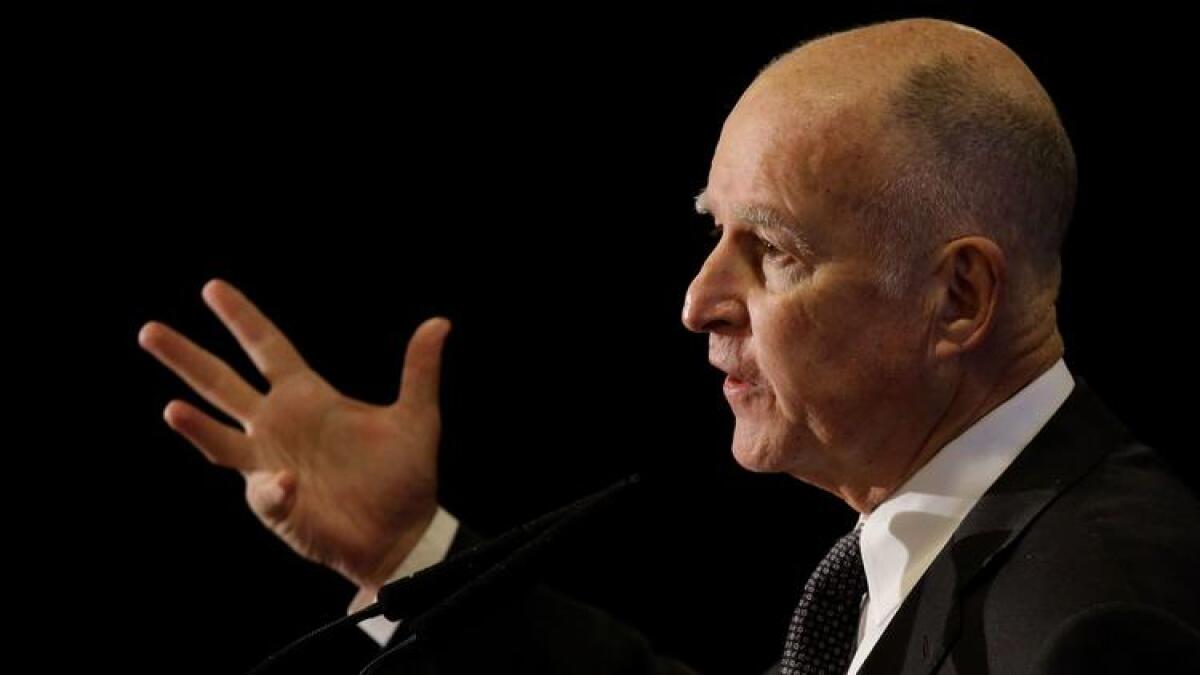
Gov. Jerry Brown has mapped out a busy European travel schedule that includes attending the next United Nations conference on climate change in Bonn, Germany.
“While the White House declares war on climate science and retreats from the Paris Agreement, California is doing the opposite and taking action,” Brown said in a statement. “We are joining with our partners from every part of the world to do what needs to be done to prevent irreversible climate change.”
Roughly two dozen public events are planned over 10 days, starting with a speech at a Vatican symposium on Saturday. Brown won’t be the only California politician at the conference. Rep. Scott Peters (D-San Diego) is speaking later that day, and state Senate President Pro Tem Kevin de León (D-Los Angeles) is scheduled to appear Friday.
After the Vatican, the governor is bouncing between Germany and Belgium, plus a stop in Norway to meet with scientists. He’s holding press conferences with the president of the European Parliament and the minister-president of Baden-Württemberg, a German state that has collaborated with California on an international climate pact.
Once the Bonn conference begins, much of Brown’s focus will be on how states, provinces and other local governments can tackle climate change absent stronger action from national leaders. He was named a special advisor to the U.N. conference for states and regions earlier this year.
Brown is scheduled to appear with former New York City Mayor Michael Bloomberg on Nov. 11 and speak at numerous other events, a packed itinerary much like the one he kept at the Paris climate conference two years ago.
His last event is expected to take place Nov. 14.
- Share via
Tom Steyer’s impeachment petition gets over 1 million signatures in first week
Billionaire Democratic donor Tom Steyer says his online petition asking Congress to impeach President Trump garnered more than 1.1 million signatures in its first week.
Last week, Steyer began airing an ad calling for Trump’s impeachment and asking viewers to sign his petition urging Congress to do so. He has spent more than $10 million to air the ad nationwide, including during the World Series.
Trump attacked the effort -- and Steyer -- on Twitter after the ad ran during “Fox and Friends” on Friday. Steyer’s staff members said they haven’t determined whether the president’s tweet boosted the signature effort.
Steyer has donated millions to Democrats and get-out-the-vote efforts in recent years. He’s weighing a primary challenge to California Democratic Sen. Dianne Feinstein.
Petitions are a common way to try to change politicians’ minds, though they work to differing degrees. Still, the rate of people signing on to Steyer’s effort is quick. For example, one of the most popular petitions on Change.org deals with removing health insurance for members of Congress if they get rid of the Affordable Care Act. It took four months for it to top 1 million signatures.
Rep. Brad Sherman (D-Porter Ranch) drafted and circulated articles of impeachment against Trump this summer, but most members of Congress -- even Democratic leaders -- have been reluctant to press for impeachment and Sherman’s efforts haven’t gained traction.
UPDATES
1:19 p.m.: The post was updated with details about Rep. Brad Sherman’s impeachment efforts.
This post was originally published at 1:08 p.m.
- Share via
California business tax incentive program should end, legislative analyst says
California no longer should give specific tax incentives to businesses and instead should provide broad-based tax relief, the state’s nonpartisan Legislative Analyst’s Office said in a new report.
The analyst’s office examined California Competes, a program that began four years ago to give tax credits to businesses looking to move to the state or remain here, and found it puts existing companies that don’t receive the awards at a disadvantage without clear benefits to the overall economy.
“Picking winners and losers inevitably leads to problems. In the case of California Competes, we are struck by how awarding benefits to a select group of businesses harms their competitors in California,” the report said. “We also think the resources consumed by the program are not as focused as they should be on winning economic development competitions with other states to attract major employers that sell to customers around the country and the world.”
California Competes has allowed the awarding of nearly $800 million in tax credits.
The legislative analyst found that more than a third of the credits awarded through California Competes resulted in no change to the overall economy and put the state’s existing businesses at a competitive disadvantage. The analyst couldn’t assess the value of the remainder of the credits because it’s impossible to know how businesses would have reacted had they not received them.
California Competes is scheduled to end next year. The analyst’s office recommends replacing it by lowering business taxes overall or, should lawmakers want to keep it, tailor the program more narrowly to focus on attracting and retaining high-value companies.
- Share via
Electric companies found at fault in North Bay fires won’t be able to pass costs onto residents under proposed bill

If electric utilities are found at fault in the recent wildfires in the North Bay, a group of state lawmakers want to ensure they don’t pass along their costs to residents.
“Victims of devastating fires and other customers should not be forced to pay for the mistakes made by utilities,” state Sen. Jerry Hill (D-San Mateo) said in a release.
Hill is one of four Bay Area legislators who said they plan to introduce a bill when lawmakers return to the Capitol in January to block any effort by utilities found at fault to recoup any costs from ratepayers.
Investigators have not identified the cause of the wildfires that ripped across Northern California this month that left more than 40 people dead and thousands of homes destroyed.
But the lawmakers said their legislation is motivated by San Diego Gas & Electric’s efforts to recover costs from wildfires in that region a decade ago.
Co-authoring the bill with Hill is Sen. Mike McGuire (D-Healdsburg), Sen. Scott Wiener (D-San Francisco) and Assemblyman Marc Levine (D-San Rafael).
- Share via
Nancy Pelosi endorses Sen. Dianne Feinstein for reelection
House Minority Leader Nancy Pelosi (D-San Francisco) endorsed the reelection bid of longtime colleague Sen. Dianne Feinstein on Monday, saying her seniority is a source of strength for the state.
“Feinstein is a strong voice and a staunch advocate for the people of California. Dianne Feinstein is uniquely positioned to defend California against Donald Trump’s constant attacks on health care, immigration and voting rights. She is a recognized leader in the Senate on economic policies that work for all Californians, defending against tax policies that hurt our state,” Pelosi said in a statement released by the Feinstein campaign.
Pelosi avoided getting deeply involved in the expected fight between Senate leader Kevin De León and Feinstein during an interview at a Los Angeles Times and Berggruen Institute event in downtown Los Angeles.
“People running against each other for office, that is a democracy,” she said at the event. “I do think that it is important to note how powerful Dianne Feinstein is in Washington, D.C., and how important that is to the state of California…. Another case can be made as to whether that is valuable or not, and that is what the discussion is about.”
- Share via
Proposed initiative would end early release for some crimes, allow more DNA collection
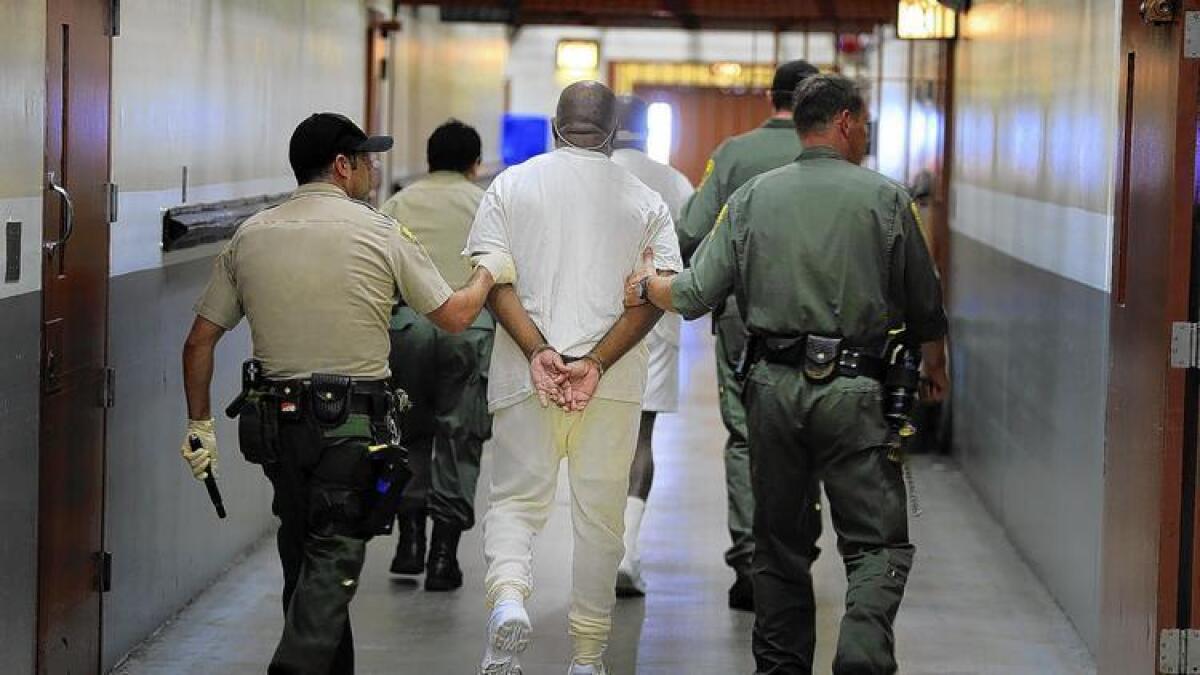
A coalition including police officers and prosecutors on Monday proposed a California state initiative that would end early release of rapists and child traffickers and expand the number of crimes for which authorities could collect DNA samples from those convicted.
The ballot measure is sponsored by the California Public Safety Partnership, and would reverse some elements of Proposition 47, which was approved by voters in 2014 and reduced some crimes deemed nonviolent from a felony to a misdemeanor.
The proposed initiative would add 15 crimes to the list of violent crimes for which early release is not an option, including child abuse, rape of an unconscious person, trafficking a child for sex, domestic violence and assault with a deadly weapon.
“These reforms make sure that truly violent criminals stay in jail and don’t get out early,” said Sacramento County Dist. Atty. Anne Marie Schubert, a leader of the coalition.
The initiative would also allow DNA collection for certain crimes, including drug offenses, that were reduced to misdemeanors under Proposition 47.
Assemblyman Jim Cooper (D-Elk Grove) said there have been 2,000 fewer hits matching DNA to cold cases annually in recent years.
He cited one case from 1989 involving the murder of two young girls in Sacramento that was solved last year by DNA taken from a man in a drug case before those were excluded from DNA collection.
“If that case happens today, right now, it does not get solved,” said Cooper, a former sheriff’s captain.
Changes in law also made theft of goods valued at less than $950 a misdemeanor, so some criminals are committing serial thefts and keeping each one to $949 or less, Cooper said. The initiative would make serial theft a felony.
The measure also mandates a parole revocation hearing for anyone who violates the terms of their parole three times.
“A Whittier police officer was recently murdered by a parolee who had violated parole five times,” said Los Angeles Police Protective League President Craig Lally, who supports the initiative.
A representative of the group behind Proposition 47 said it was not reasonable to blame the ballot measure for an uptick in some crimes in some parts of the state.
“Fluctuations in crime have much more to do with economic and social policies and practices,” said Tom Hoffman, a spokesman for the group Californians for Safety and Justice. “It’s so much more complicated than one piece of legislation as an issue.”
The proponents of the initiative need to collect signatures from 365,880 voters by the end of April to qualify the initiative for the November 2018 election.
- Share via
When men with power go too far: After years of whispers, women speak out about harassment in California’s Capitol
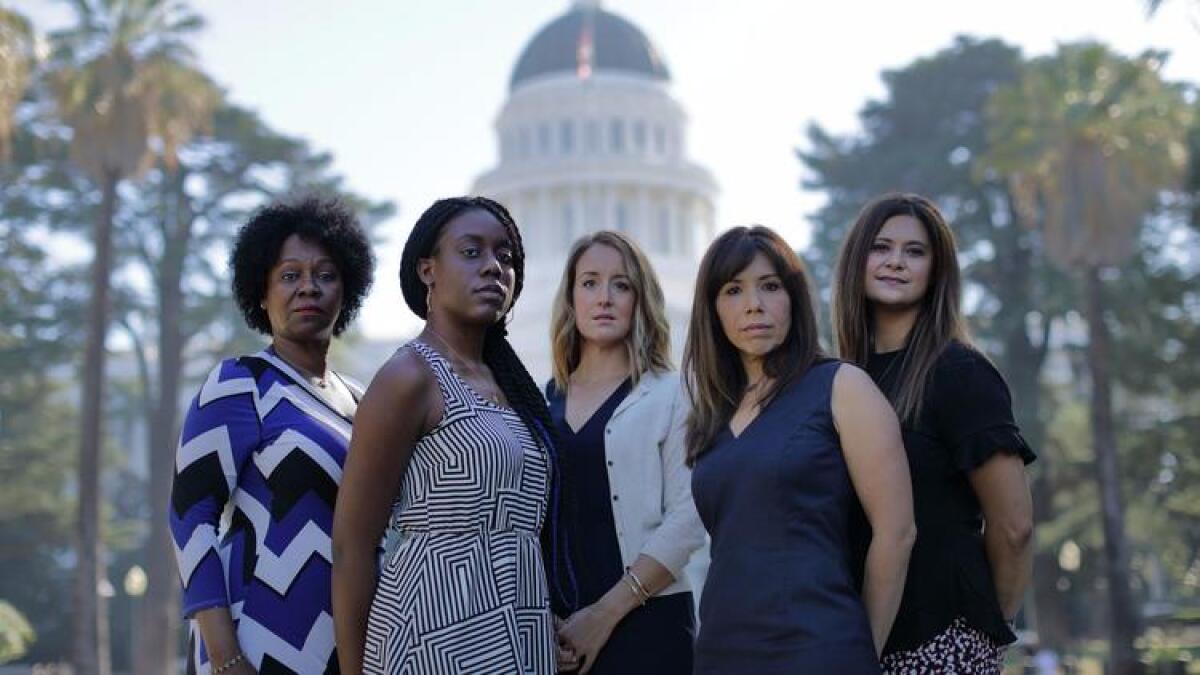
It started with a dinner invitation from a former assemblyman more than twice her age. He had offered his services as a mentor, but his hand reaching for her knee under the table revealed other intentions. Then came the late-night phone calls and unexpected appearances at events she had to attend for her job in the Capitol.
Fresh out of college, Amy Brown did what she thought women were supposed to do in these situations — she reported him. The former assemblyman accused her of slander, an experience that left her so humiliated that she left Sacramento for a new job in San Jose.
“I immediately got the hell out of town,” Brown said. “I felt like the people — the person — I was relying on for advancement in my career was preying on me.”
Stories like these have taken many forms through the years. Sometimes it’s a professional meeting that turned inappropriately sexual, or it’s a groping hand on a backside. In one case, a woman said a lawmaker masturbated in front of her in a bar bathroom.
No matter the details, each story involves a man with power — the kind of power bestowed by voters, an influential lobbying client or a supply of campaign cash. And instead of wielding that power to shape politics or public policy, the man used it to proposition women or to touch them inappropriately.
- Share via
Big jump in the number of House challengers isn’t great news for California Republicans
So far this year, 80 challengers have reported raising money across California for the 2018 midterm elections, more than triple the number who had done so at this point in the 2016 election. Collectively, they’ve raised more than $14.9 million, and 70% of that has gone to the four Republican-held districts in Orange County that Democrats consider key to their chances.
There haven’t been this many congressional challengers in California’s House races this early in the game since at least 2003, and that could be bad news for Republican incumbents.
- Share via
California’s Senate culture doesn’t encourage women to file complaints. Here’s how that could change
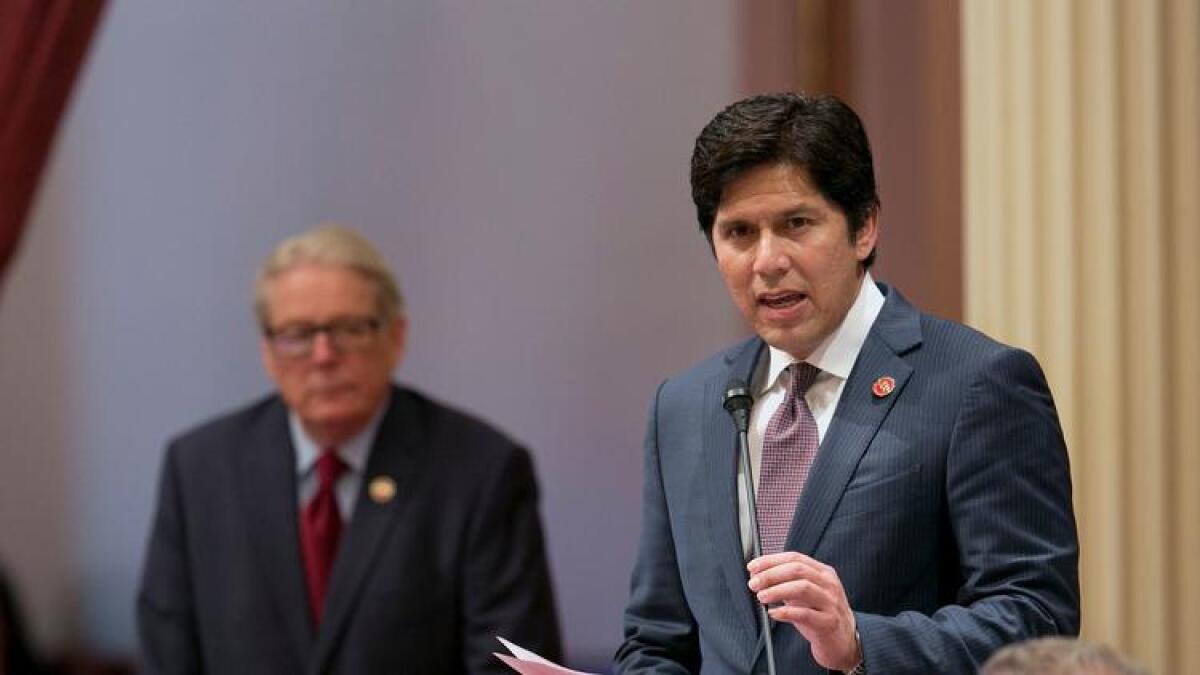
In 2014, reeling from scandals that led to the suspension of three Democratic senators, California’s state Senate changed its policies to make it easier for employees, members and the public to sound the alarm about misconduct.
A Times analysis of those rule changes shows a lack of follow-through to make reporting complaints more accessible. And the lawmaker who worked on changes in the Senate’s operations after that scandal says more could have been done.
Then-Senate leader Darrell Steinberg (D-Sacramento) suggested at the time that the move would lead to “positive cultural change and strengthen the integrity of this great institution.”
But as the Capitol now soul-searches over allegations of widespread sexual harassment, the current legislative leaders acknowledge the culture still does not encourage women to file complaints. The Senate’s effort to reform itself three years ago — and how it fell short — is instructive as both legislative houses embark on a new round of self-improvement.
- Share via
From the 1979 archives: Politics, Marriage Hard to Mix, Legislators Find
Today’s column about sexual harassment in Sacramento references the above May 7, 1979, article detailing how the Capitol was a sexual playground.
I’ve been closely watching Sacramento for half a century. It’s my observation — OK, a guess, because no one keeps statistics — that sexual harassment at the state Capitol is about the same now as it was decades ago. Sexual bullies of both parties have always plagued politics.
- Share via
High taxes on legal pot in California could mean black market will thrive

State and local taxes on marijuana could surpass 45% in some parts of California, jeopardizing efforts to bring all growers and sellers into a state-licensed market in January, according to the global credit ratings firm Fitch Ratings.
“High tax rates raise prices in legal markets, reinforcing the price advantage of black markets,” the firm said in a report Monday. “California’s black markets for cannabis were well established long before its voters legalized cannabis in November 2016 and are expected to dominate post-legalization production.”
The report said that increased enforcement may blunt the illegal market, “but high taxes may complicate such efforts by diverting in-state sales to the black market.”
California is scheduled to begin issuing licenses to grow, transport and sell medical and recreational marijuana on Jan. 1 and will charge a 15% excise tax, as well as a state cultivation levy of $9.25 per ounce for cannabis flowers and $2.75 per ounce for leaves.
Hundreds applied to be on California’s pot advisory committee. Here’s who got picked >>
In addition, local business taxes have been approved by 61 cities and counties ranging from 7.75% to 9.75%.
The marijuana market is expected to provide a windfall for state and local treasuries.
“In the handful of states that legalized nonmedical cannabis prior to 2016, tax receipts have generally outpaced initial revenue estimates and have shown strong year-over-year gains,” Fitch Ratings said. But California could end up being one of the highest taxing states in the country if proposals stand.
- Share via
Los Angeles Mayor Eric Garcetti says he won’t run for governor
- Share via
Have you experienced sexual harassment in government or politics? Tell us your story
If you work in government or politics and have experienced sexual harassment, we’d like to hear from you.
Please tell us your story using the form below. We will not share your personal contact information.
- Share via
California Assembly Speaker applauds Capitol staffer’s ‘bravery’ in going public with complaint against assemblyman
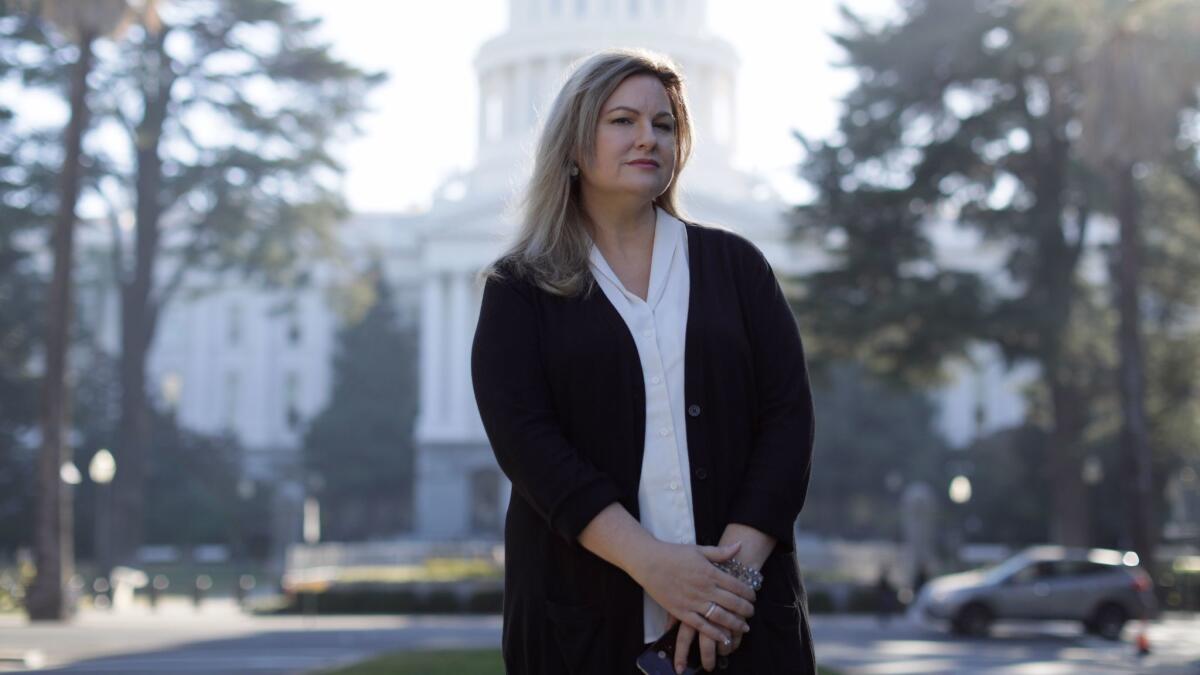
Assembly Speaker Anthony Rendon (D-Paramount) said Friday that the experience of a staffer who filed a complaint eight years ago against now-Assemblyman Raul Bocanegra illustrates why the Capitol culture must change.
Elise Flynn Gyore told The Times about her experience filing a complaint against Bocanegra, who was then a legislative staffer, after she said he groped her and followed her in a manner she found threatening at a 2009 after-work event in a Sacramento bar.
The Friday morning story in The Times was the first time she had spoken publicly of the incident and the complaint, which resulted in Bocanegra being disciplined.
“I appreciate Ms. Gyore’s bravery in bringing this incident forward. We have to change the culture in the Capitol and in society and her experience shows why,” Rendon said in a statement Friday afternoon. “How incidents of harassment were handled in the past can inform our current efforts to improve the system and to build a future where these injustices are prevented before they happen and no employee has to fear harassment or abuse.”
Bocanegra, who was first elected in 2012, is part of Rendon’s leadership team, serving in the position of majority whip. A top lieutenant to Rendon, Assemblywoman Lorena Gonzalez Fletcher (D-San Diego), also chimed in with support for Gyore on Friday.
Former Speaker John A. Pérez (D-Los Angeles), who led the Assembly from 2010 to 2014, said he was unaware of the complaint’s existence until The Times’ report.
He said he had never heard of any complaints — formal or informal — against Bocanegra, nor had he witnessed any inappropriate behavior from the Pacoima Democrat.
Also on Friday, the organizers of We Said Enough, a recently launched campaign against harassment, thanked Gyore for sharing her story.
“This is an act of true courage — and we support every woman who chooses to do so. Sadly, this story is just one example of how the existing system fails victims and survivors. We are resolute in our call for action,” the group said in a statement. The group’s organizers added that they are calling for an overhaul to the complaint process — such as confidential reporting, an independent oversight body and whistleblower protections — to better guard against harassment.
- Share via
Rep. Darrell Issa goes after Gov. Jerry Brown on tax debate, criticizing ‘contrived letters pretending to care’
As the debate over tax reform rages in Washington, Rep. Darrell Issa (R-Vista) is blaming Gov. Jerry Brown’s policies for creating a situation where Californians pay high local and state taxes and claim them as a deduction of their federal taxes.
An estimated one in three Californians claim the State and Local Tax, or SALT, deduction, that would end under a tax plan proposed by the GOP.
“I recognize the role of the state and local tax deduction to reduce the tax burden on many Californians, but let’s be clear: It has only become of such importance as a direct result of the tremendous weight that your misguided policies have put on California taxpayers,” Issa wrote in a letter to Brown on Friday.
Brown sent letters of his own to the GOP delegation Wednesday urging them all not to support the Republican budget, which allowed for a $1.5-trillion deficit increase that sets the stage for President Trump’s tax cuts.
With the midterm elections critical to the battle for control of the U.S. House, Issa and other vulnerable California Republicans, especially those in wealthy Southern California, where constituents save thousands on their taxes through the deduction, are being closely watched.
There were 20 Republican “no” votes. Several opposed the budget because of a potential repeal of the federal deduction for state and local taxes, which would hit especially hard in wealthier states such as New York and California. But all 14 California Republicans voted for the budget.
Issa also admonished Brown for sending the letters.
“Government must foster an environment that promotes economic growth. Rather than sending contrived letters pretending to care about the burdens placed on taxpayers in our state, I implore you to turn away from the era of ever-increasing taxes that have continued under your Administration and instead seek policies that actually lower the tax burden on all Californians,” Issa said in his letter.
Brown responded Friday in a statement to The Times: “It’s unconscionable that Rep. Issa would tax the people of his district while exempting his corporate allies and sponsors. What a betrayal of his oath of office.”
2:04 p.m.: This post has been updated with comment from Brown. It was originally published at 12:58 p.m.
- Share via
California Legislature colleagues back Kevin de León’s U.S. Senate bid
- Share via
Behavior that didn’t meet ‘expectations for professionalism.’ Read the 2009 letter disciplining Raul Bocanegra
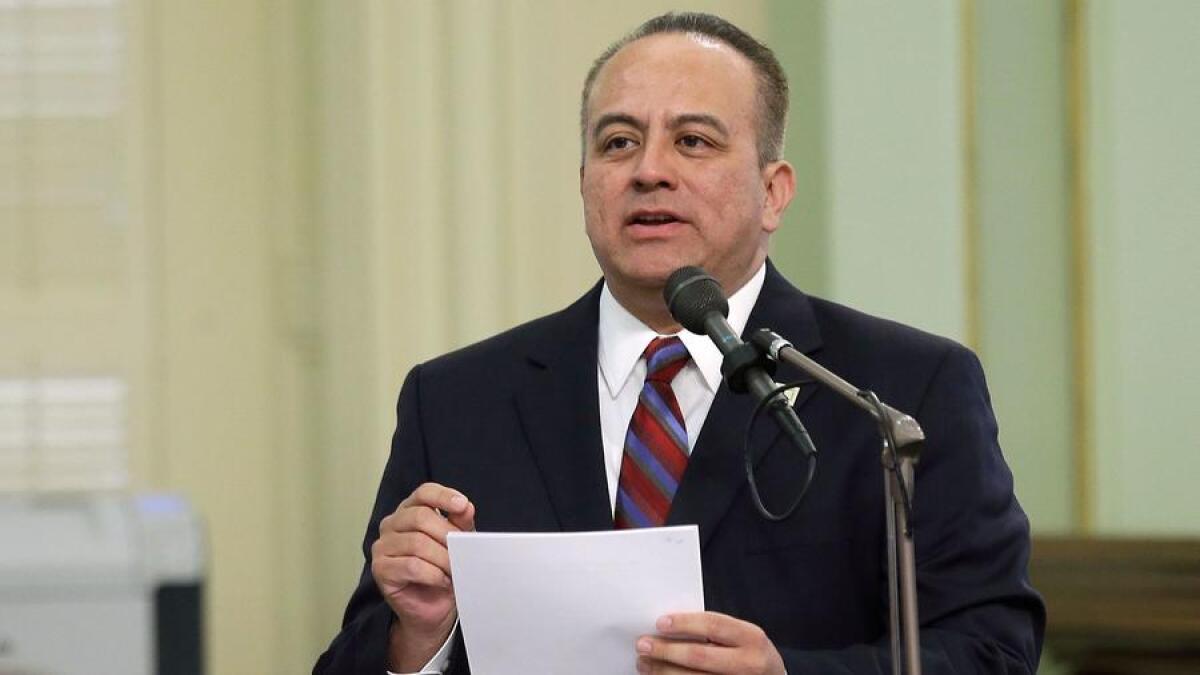
California Assemblyman Raul Bocanegra was disciplined after a human resources investigation eight years ago, when a female Capitol staffer accused him of “inappropriate and unwelcome physical contact,” The Times has learned.
Elise Flynn Gyore said Bocanegra, at the time chief of staff to then-Assemblyman Felipe Fuentes, groped her and followed her in a manner she found threatening at an after-work event attended by legislators, staff and lobbyists.
A weeks-long investigation by independent attorneys hired by the Legislature concluded that “it is more likely than not that Bocanegra engaged in behavior that night which does not meet the Assembly’s expectations for professionalism,” according to a June 22, 2009, letter from the Assembly Rules Committee reviewed by the Los Angeles Times.
- Share via
Gov. Jerry Brown says California Republicans have ‘slavish adherence’ to their party’s tax plan
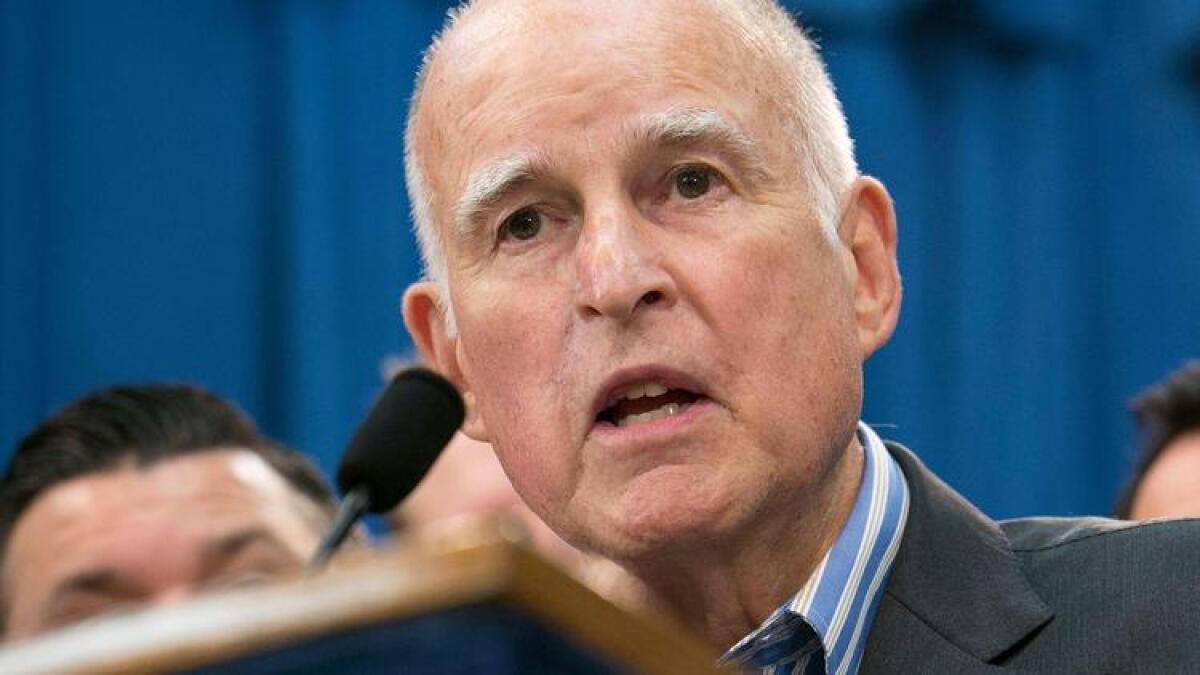
Gov. Jerry Brown took aim at the sweeping tax overhaul plan in Congress and California’s Republican delegation on Thursday, saying their support of the plan is wrong “economically and morally.”
Brown, who joined New York Gov. Andrew Cuomo on a conference call with reporters, aimed most of his fire at the provision to cancel deducting local and state taxes paid from federal taxes. Both governors said it could have a profound impact on their states’ bottom lines. Brown criticized California’s 14 Republican House members for their Thursday budget vote, which allows for a $1.5-trillion deficit to help finance tax cuts.
“I know there is a lot of slavish adherence to the Republican leadership,” Brown said. “It’s bad for California. They’re doing a disservice.”
California and New York taxpayers have long been able to deduct the cost of paying local and state taxes from their federal tax liability. Both governors said Thursday they believed the effort by President Trump and Republicans to be at least somewhat motivated by their states voting for Democrat Hillary Clinton over Trump last November.
“It’s using a handful of states to finance the tax cuts for their states,” Cuomo said.
Brown, who sent personal letters to all California GOP members of the House urging them not to go along, said the proposal was particularly unfair in light of how it would not apply equally to corporations.
“It’s a gross manipulation of our tax code,” he said. “It’s a Hail Mary pass by the Republicans.”
- Share via
California Rep. Jackie Speier shares her sexual assault story in an effort to change Capitol Hill
Rep. Jackie Speier told a story of being forcibly kissed by a high-ranking congressional staff member to kick off her effort to change how sexual abuse reports are handled on Capitol Hill.
Speier is urging other members of Congress and staff to tell their stories using the hashtag #MeTooCongress in a play off the viral #MeToo hashtag that began after a New York Times story detailed sexual harassment and assault allegations against Hollywood producer Harvey Weinstein.
Speier (D-Hillsborough) said in a video posted Friday morning that she was a staffer on Capitol Hill when a chief of staff she doesn’t identify grabbed her face and kissed her. Speier worked for a congressman in the 1970s.
Speier told Politico she will introduce legislation next week calling for an overhaul of the Office of Compliance, where Capitol Hill staffers are expected to file harassment complaints.
Speier has repeatedly filed legislation aimed at changing the reporting process for victims who work on Capitol Hill. Harassment victims must contact a little-known office, where they first receive up to 30 days of counseling. Then, victims must go through a 30-day period of mediation with the accused before they are eligible to pursue an administrative hearing or a lawsuit against their attackers.
The current system is “constructed to protect the institution — and to impede the victim from getting justice,” Speier told Politico.
Speier told Politico that few staffers are aware of where to go, or are put off by the long process. That means individual Capitol Hill offices handle claims internally, or not at all, she said. Sexual harassment training also is not a requirement for working in Congress — it’s left to individual offices.
Speier has used personal stories as examples before, including when she discussed an abortion she had on the House floor in 2011.
9:49 a.m.: This post had been updated with more detail.
This post originally published at 5:58 a.m.
- Share via
Here’s why Republicans could help send Dianne Feinstein back to Washington — even if they can’t stand her
It’s the voters like Republican Larry Ward — conservatives who feel voiceless and adrift, bobbing like red specks in a blue sea — who could help usher the 84-year-old Dianne Feinstein back to Washington with a new lease on her Senate seat.
Like most voters here in El Dorado County, Ward supported President Trump. He can’t understand why Democrats and the media pile on and keep him from cutting taxes and fulfilling a campaign pledge to repeal Obamacare.
He certainly doesn’t think Feinstein’s been too kind to Trump — the argument made by her newly announced challenger, Kevin de León. The state senator from Los Angeles and others on the left were spitting fire a few weeks back when Feinstein allowed as how she hoped, given time and a radical transformation, Trump might end up being a good president.
- Share via
Trump calls billionaire activist Tom Steyer ‘wacky’ and ‘unhinged’
President Trump called Democratic megadonor Tom Steyer “wacky” and “unhinged” Friday after apparently seeing an ad that features the San Francisco billionaire calling for Trump to be impeached.
The 60-second television ad has been running for nearly a week, and has been spotted during World Series broadcasts, but it was its appearance during “Fox and Friends” on Friday morning that might have caught Trump’s attention.
Trump tweeted shortly after the ad ran that Steyer “has been fighting me and my Make America Great Again agenda from the beginning,” adding the billionaire environmentalist “never wins elections!”
The $10-million advertising campaign directs people to a website with a petition calling on Trump to be impeached.
Steyer has donated tens of millions to Democratic candidates, and funded get-out-the-vote operations through his climate change political action committee.
The former hedge fund manager has flirted with running for office, and is currently weighing whether to challenge Sen. Dianne Feinstein for the U.S. Senate seat she currently holds.
- Share via
Car runs into immigration protesters outside Rep. Ed Royce’s district office

A vehicle drove into a group of protesters outside of GOP Rep. Ed Royce’s office in Brea on Thursday afternoon, but no injuries have been reported to police so far. (Tony Mendoza / Unite Here)
A vehicle drove into a group of protesters outside GOP Rep. Ed Royce’s office in Brea on Thursday afternoon, but no injuries have been reported to police so far.
The alleged driver, 56-year-old Daniel Wenzek of Brea, was arrested on suspicion of assault with a deadly weapon. He was booked and released pending further investigation, according to Lt. Kelly Carpenter of the Brea Police Department.
Organizers say several hundred people were protesting outside Royce’s office, many of them arriving on buses after a morning news conference with elected officials and labor leaders in Los Angeles’ MacArthur Park. They were trying to deliver letters to Royce (R-Fullerton) about what losing temporary protected immigration status would mean to them, said Andrew Cohen, a communications specialist with the organization Unite Here.
- Share via
California Secretary of State Alex Padilla backs Gavin Newsom for governor over former colleague Antonio Villaraigosa
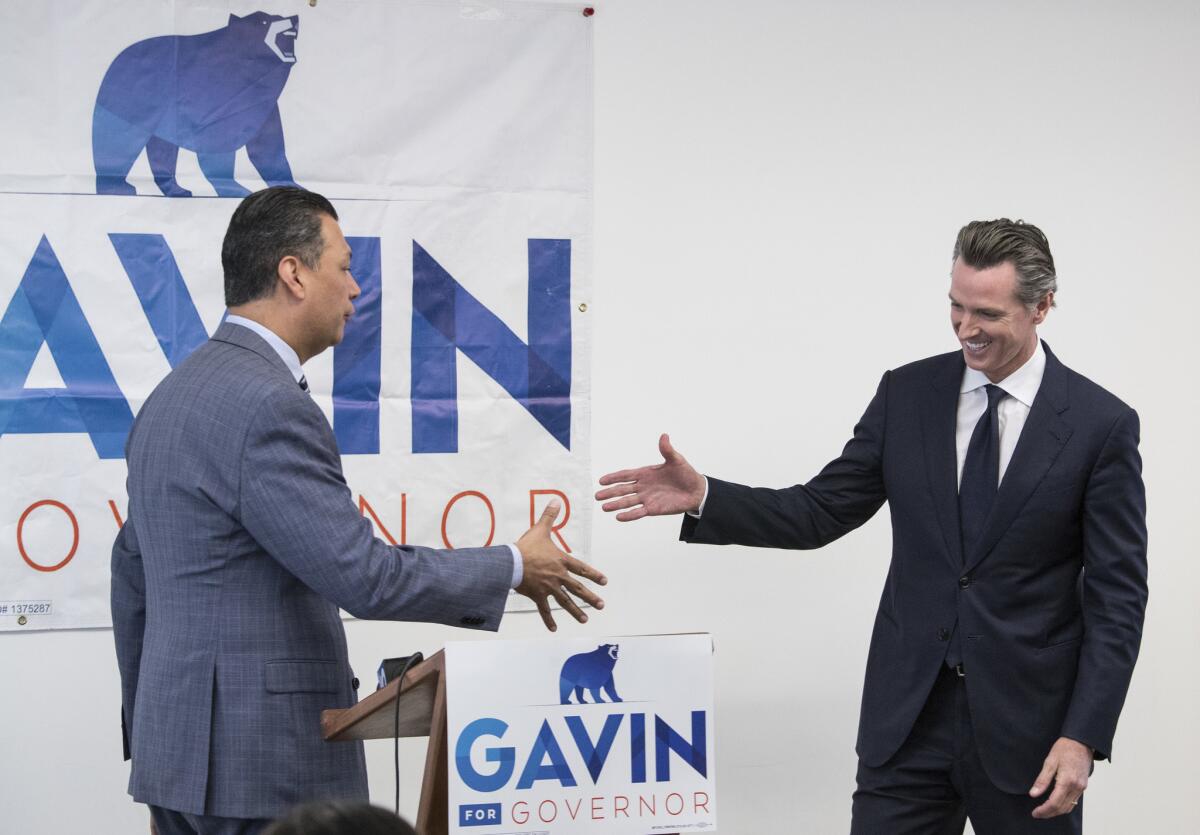
Secretary of State Alex Padilla, the highest-ranking Latino in a statewide elected position in California, endorsed Gavin Newsom for governor on Thursday.
Padilla said he had known Newsom for more than a decade and admired his track record as mayor of San Francisco and now lieutenant governor.
“It’s always important to [have] leaders that are committed and get it done, and that’s what I’ve seen in Gavin Newsom over and over and over again,” Padilla said, speaking to dozens of Newsom supporters at a union hall in downtown Los Angeles.
The endorsement was seen as a slap at former Los Angeles Mayor Antonio Villaraigosa, who is one of Newsom’s top rivals in the governor’s race. Padilla was president of the Los Angeles City Council during the two years Villaraigosa was a member of the body, and for the first six months of Villaraigosa’s tenure as mayor.
But the two men have never been viewed as close allies. They come from different power bases for Latino politicians in Los Angeles — Villaraigosa from the Eastside and Padilla from the San Fernando Valley. They also have not supported each other’s political pursuits. In 2001, Padilla backed James Hahn over Villaraigosa in the mayoral race. In 2006, Villaraigosa backed Cindy Montañez in a state Senate race over Padilla.
Padilla said he has a relationship with all of the top Democrats running for governor.
“This is a tough one because I do know Antonio Villaraigosa and I know John Chiang and I know Gavin Newsom, but I think that because of what’s happening in the political environment at this time, this isn’t one where we can sit back, ‘Yeah. OK. Cool, let’s see who wins and we’ll work with whoever,’” Padilla said. “If there is a candidate I believe is best for the future of California, I’m compelled to weigh in and that’s what I’m doing today.”
Luis Vizcaino, a Vilaraigosa spokesman, said the announcement was to be expected and noted that Padilla had a leadership role in Newsom’s short-lived 2009 gubernatorial campaign.
“The only surprise here is we thought Alex had endorsed Gavin months ago considering he was Gavin’s Campaign Chair the first time he ran for governor,” Vizcaino said in an email.
Villaraigosa and Chiang, the state treasurer, have also received key endorsements from Latino politicians. Villaraigosa has the backing of the Latino Caucus in the state Legislature, former Los Angeles County Supervisor Gloria Molina and Lucille Roybal-Allard. Chiang has won the support of Assembly Speaker Anthony Rendon and Los Angeles City Councilman Jose Huizar.
Updated at 2:07 p.m.: This post was updated to add a comment from Villaraigosa’s campaign.
- Share via
Rep. Maxine Waters asks Twitter for information about Russian accounts used to attack her
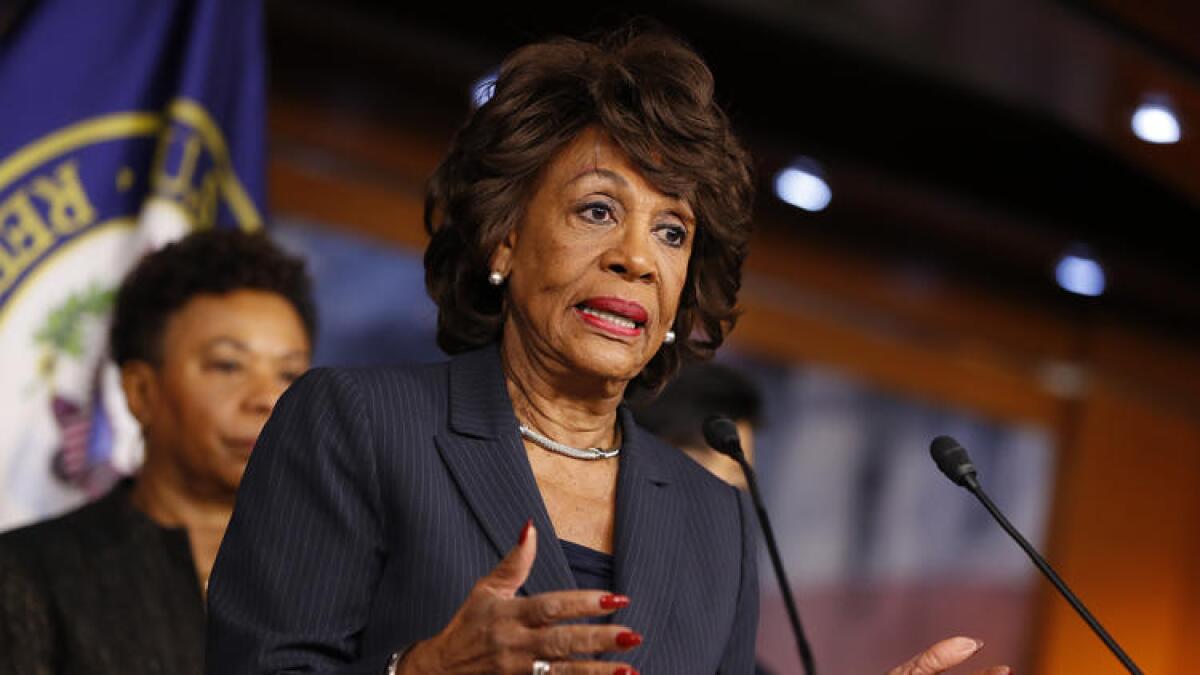
U.S. Rep. Maxine Waters wants Twitter to hand over information about any Russian-linked accounts that have attacked her or her Los Angeles congressional district.
In a letter to Twitter Chief Executive Jack Dorsey on Thursday, the outspoken Democrat asked the company to disclose all of the accounts associated with Russian- or Kremlin-linked firms that have targeted her since the 2016 election. She also asked for details on how many times the tweets mentioning her were shared, including if they were shared by President Trump or conservative outlets.
Waters has been a vocal critic of Trump, which has made her a darling of the left and a frequent source of derision on the right.
“While I have never publicly discussed it before today, I have been aware for some time that I was targeted by Russian operatives whose interests were aligned with Donald Trump,” Waters said in a statement. “I have often noticed that every time I tweeted about Trump and Russia, dozens of strange accounts would immediately tweet various lies and falsehoods that fringe alt-right websites would subsequently use as a basis to write fake news stories.”
Waters said the information from Twitter is needed to demonstrate that congressional members’ efforts to communicate with constituents online have been targeted by Russian disinformation campaigns.
Earlier this month, Buzzfeed reported that an account pretending to speak for the Tennessee Republican Party was actually run by Russian trolls. The account tweeted about Waters for months, including during a town hall meeting in her district, prompting an “Impeach Maxine Waters” hashtag to trend on Twitter.
She blames her criticism of Trump as the reason she was targeted by the account.
“I am concerned that if this issue is left unresolved, more elected officials whom Russians determine are Donald Trump’s political opponents, both Republicans and Democrats, will be targeted and subjected to social media schemes to undermine and interfere in their elections at local, state and national levels,” Waters wrote in the letter.
- Share via
California’s Rep. Paul Cook picked to lead Foreign Affairs subcommittee
Rep. Paul Cook (R-Yucca Valley) has been named chairman of the House Foreign Affairs subcommittee on the Western Hemisphere.
House Foreign Affairs Committee Chairman Ed Royce (R-Fullerton) made the announcement in a news release Thursday morning following the former subcommittee chairman Rep. Jeff Duncan’s (R-S.C.) departure from the committee this week.
“As a former Marine Corps colonel, Rep. Cook is deeply committed to defending U.S. interests worldwide. I look forward to working with him to continue holding the [Raul] Castro and [Nicolas] Maduro regimes [of Cuba and Venezuela, respectively] accountable for their brutal repression, while increasing U.S. commercial opportunities throughout the hemisphere,” Royce said in a statement.
California holds several leadership positions on the Foreign Affairs Committee. Rep. Dana Rohrabacher (R-Costa Mesa) is the chairman of the Europe, Eurasia, and Emerging Threats subcommittee. Rep. Brad Sherman of Sherman Oaks is the highest ranking Democrat on the Asia and the Pacific subcommittee and Rep. Karen Bass of Los Angeles is the highest ranking Democrat on the Africa, Global Health, Global Human Rights, and International Organizations subcommittee.
- Share via
GOP tightens restrictions on Rep. Dana Rohrabacher’s subcommittee because of scrutiny over his Russia connections
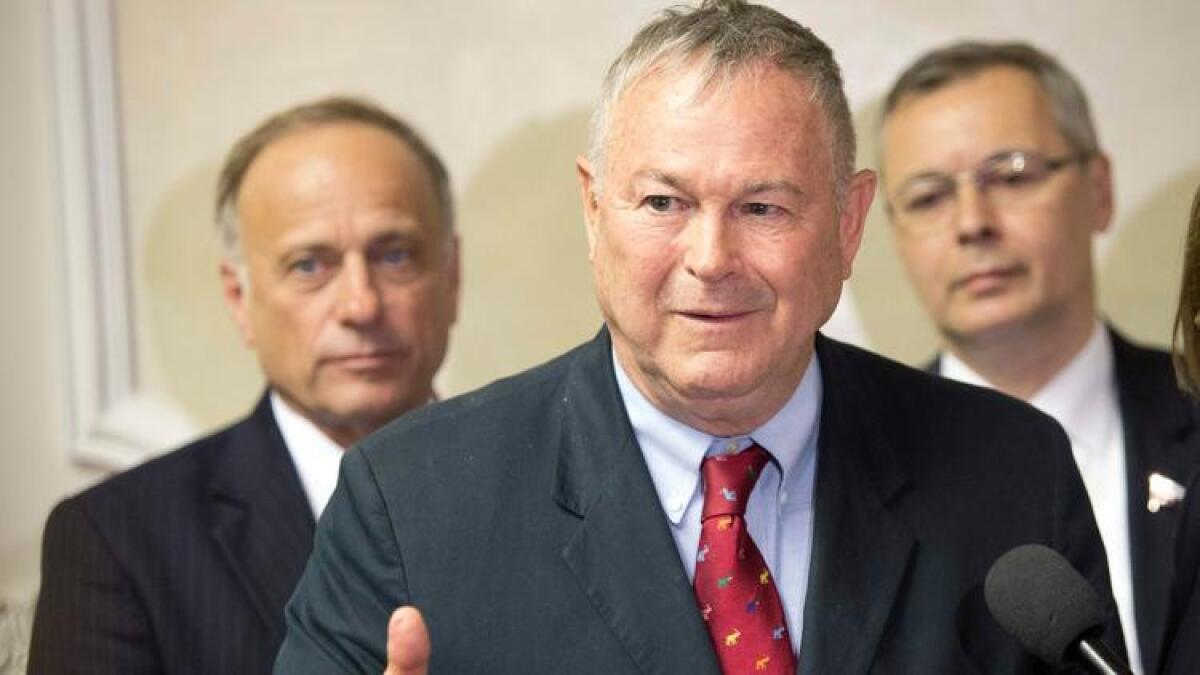
The congressional subcommittee led by California Rep. Dana Rohrabacher (R-Costa Mesa) is being heavily monitored by GOP leaders because of allegations the Orange County congressman has been overly influenced by his connections to Russia.
House Foreign Affairs Committee Chairman Ed Royce (R-Fullerton) will be “more involved in guiding the direction” of the subcommittee that is in part responsible for examining U.S. policy in Russia, said a senior congressional aide who asked not to be identified in order to discuss internal committee matters.
Rohrabacher has long said that the United States needs a better relationship with Russia, puzzling colleagues who have speculated privately about why he’s willing to work with Russian President Vladimir Putin.
Connections between Rohrabacher and Russian officials have been newly highlighted as Congress investigates Russian attempts to interfere in the 2016 U.S. presidential election.
- Share via
California’s GOP members vote in favor of Republican budget, paving way for tax overhaul
All 14 California House Republicans on Thursday voted in favor of the GOP’s budget, which paves the way for overhauling the U.S. tax system.
The budget, which allows for a $1.5-trillion deficit increase that sets the stage for President Trump’s tax cuts, passed 216 to 212, with 20 Republicans joining Democrats in opposing it.
At the root of their objection is the potential repeal of the federal deduction for state and local taxes, which would hit especially hard in wealthier states like New York and California.
Gov. Jerry Brown had implored the GOP members not to support the budget, saying there hasn’t been enough time to fully understand what it will mean to the estimated 1 in 3 Californians who claim the deduction. Democrats are targeting nine of the state’s 14 Republican-held districts, and have said they’ll make the elimination of the tax deduction an issue in the campaign.
Rep. Steve Knight of Palmdale said he voted for the budget because he’s been assured that a fix will be made to the tax plan that will address or offset the potential tax increase caused by the elimination of the tax deduction. The tax plan is scheduled to be unveiled next week.
“Still worried about it, still working on it,” Knight said after the vote. “I am confident [it will be fixed], but I’ve also said that is my No. 1 priority, so if we can’t get it fixed then we’re going to have problems.”
- Share via
Gov. Jerry Brown urges California GOP House members to vote no on budget bill: ‘First let’s get the facts’
Gov. Jerry Brown implored California’s GOP House members to oppose their party’s budget bill over a provision that will end a deduction for state and local taxes used by one in three Californians.
In letters to each Republican member of the California congressional delegation, Brown asked the members to at least ask for more time to learn the specifics of the plan.
“First let’s get the facts. Then, debate the issue. And then we can decide what’s the right thing to do,” Brown says in his letter.
The potential repeal of the state and local tax (SALT) deduction — the federal income tax deduction for state and local taxes paid — would hit especially hard in wealthier areas.
The vote is scheduled to take place Thursday morning.
- Share via
Six female California lawmakers back Dianne Feinstein in Senate race
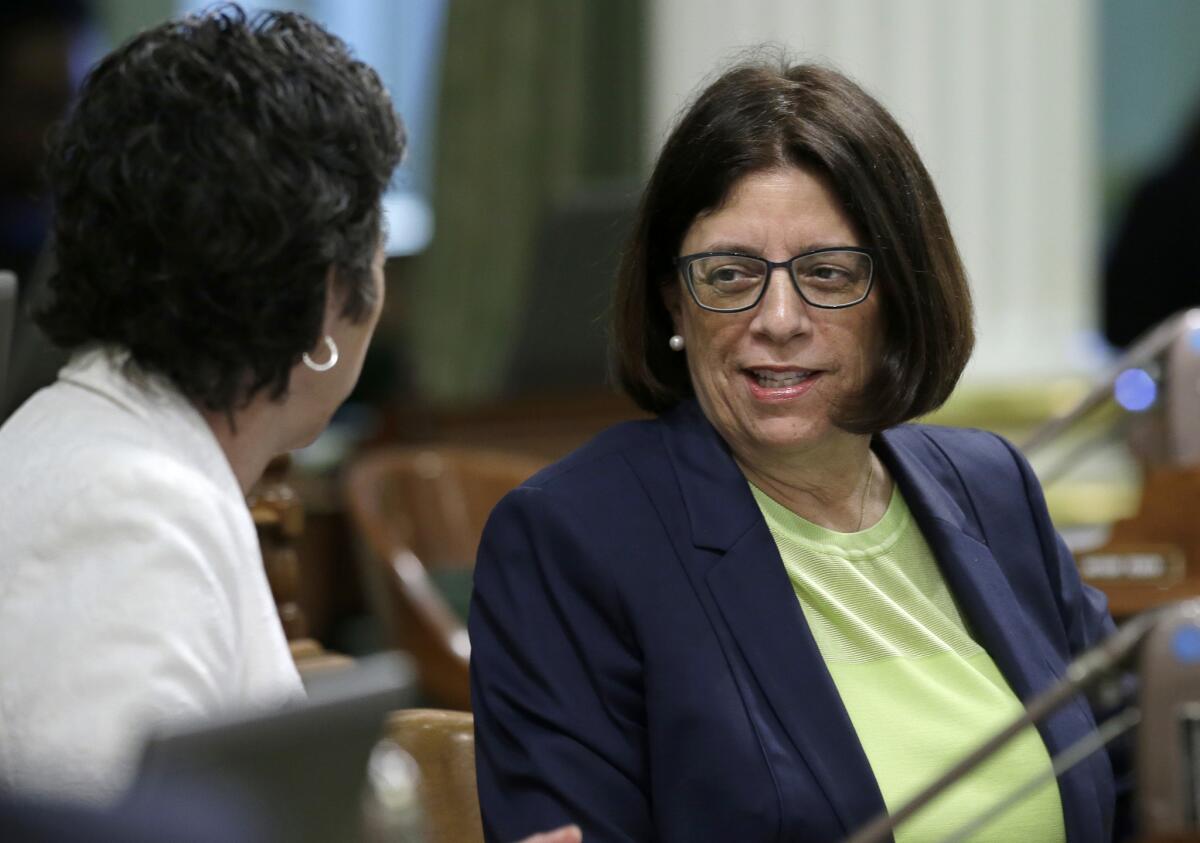
Six California Assembly committee chairwomen endorsed Democratic Sen. Dianne Feinstein on Wednesday over their state Capitol colleague, Senate leader Kevin de León.
In a statement released by Feinstein’s campaign, Assemblymembers Cristina Garcia (D-Bell Gardens), Susan Talamantes Eggman (D-Stockton), Jacqui Irwin (D-Thousand Oaks), Blanca E. Rubio (D-Baldwin Park), Cecilia Aguiar-Curry (D-Winters) and Anna Caballero (D-Salinas) said the state needs Feinstein “in these uncertain and difficult times.”
“We are proud to endorse Sen. Dianne Feinstein, who has been an inspiration for all of us. The first woman to serve on the U.S. Senate Judiciary Committee, Sen. Feinstein is now the ranking Democrat on the Judiciary Committee. In that position, she is defending California against the Republicans and the Trump administration on critical issues like immigration, women’s rights, federal judicial appointments, LGBT rights, civil rights, and gun control,” they said.
De León is the highest-profile Democrat to announce plans to challenge Feinstein in her bid for a fifth full term.
- Share via
Rep. Scott Peters endorses fellow Democrat Paul Kerr in House race against Darrell Issa
- Share via
Kevin de León vows to back Medicare for all, signaling key issue in 2018 Senate campaign
State Senate leader Kevin de León’s opening salvo in the U.S. Senate race against Sen. Dianne Feinstein takes on one of the main frustrations progressives have voiced with her, a refusal to support single-payer health care.
“I believe that every family, it doesn’t make a difference who you are or where you come from, deserves to have quality healthcare. It is a universal right,” De León says in a video released by his campaign Wednesday. “It’s not the exclusive privilege of the elite and the wealthy.”
The concept of single-payer healthcare has grown in popularity among Democrats since the 2016 election, with some members of the so-called Sanders wing of the party urging Democrats to use support for it as a litmus test in 2018.
Such a program is unlikely to become law while Republicans control both chambers of Congress.
Feinstein has said she doesn’t support expanding Medicare to the entire population “at this stage” and has cited the cost of doing so as a reason.
If he were elected, De León would join Sen. Kamala Harris (D-Calif.) and 15 other Democratic Senators as co-sponsors of the bill proposed by Sen. Bernie Sanders (I-Vt.).
- Share via
Sen. Kamala Harris won’t back federal spending bill without DACA fix
Sen. Kamala Harris (D-Calif.) said Wednesday that she won’t back a bill that allows the federal government to spend money unless Congress has a legislative fix to address the legal status of hundreds of thousands of people brought to the country illegally as children.
“I will not vote for an end-of-year spending bill until we are clear about what we are going to do to protect and take care of our DACA young people in this country,” Harris said. “Each day in the life of these young people is a very long time, and we’ve got to stop playing politics with their lives.”
President Trump announced in September that he was giving Congress until March before the program would shutter and recipients would begin losing work permits and protection from deportation. An estimated 200,000 of the nearly 800,000 recipients of the Delayed Action for Childhood Arrivals program live in California, giving the Golden State an outsized stake in resolving their legal status.
Harris spoke at a Capitol Hill news conference Wednesday with other members of the California delegation to urge quick action on the issue.
“It is absolutely urgent that we pass the legislation,” House Minority Leader Nancy Pelosi (D-San Francisco) said. “We are determined that the Dream Act will be the law of the land before the year is out.”
Democrats and Republicans are negotiating the details of a fix, and when something could pass. Pelosi has hinted that if Republicans don’t have the votes within their party to pass the end-of-year spending bill, which Congress has to pass to keep the government open, Democrats will offer their votes — for a price.
- Share via
Rep. Dana Rohrabacher gets a second Republican challenger
A second Republican is jumping in to challenge GOP Rep. Dana Rohrabacher of Costa Mesa, and he’s pitching himself as an alternative for conservatives who are fed up with Rohrabacher’s controversial antics.
Paul Martin, 52, is a freelance writer and self-proclaimed “Reagan Republican” who lives in Costa Mesa. Rohrabacher is himself a former speechwriter for Reagan.
Martin grew up in Anaheim with an Italian immigrant mother and a Mexican American father, and says he’s opposed to many of the policies coming out of the Trump administration.
“I’ve had enormous struggle with the rhetoric that’s coming out of Washington, D.C., and even more so with the rhetoric that comes out of Dana Rohrabacher’s mouth,” Martin said in an interview. “It’s just not in the spirit that I grew up with.”
Following President Trump’s travel ban announcement, Martin started the Christian-Muslim Alliance, a campaign aimed at fostering dialogue between people of different faiths. He describes himself as a “raging centrist” on a personal blog, where he’s criticized Trump’s response to white supremacist violence in Charlottesville, Va., and Rohrabacher for taking money from the National Rifle Assn.
Still, Martin says he’s a “true conservative” who wants to focus on issues of “human dignity” and bring better-paying jobs to the district.
- Share via
Gov. Jerry Brown, Texas Gov. Greg Abbott send a message with their World Series bet

As governors of states hit hard by natural disasters, the leaders of California and Texas hope to send a message with their wager on the outcome of the World Series.
The winner will receive food or drink from either California’s wine country or Houston’s best barbecue joints.
The bet, made Tuesday before the start of the first World Series game between the Los Angeles Dodgers and the Houston Astros, came with a request from both Gov. Jerry Brown and Texas Gov. Greg Abbott for tourists to come back to those regions as soon as possible.
“While we don’t expect to have to send any vino to Texas, we hope travelers from all over the world – yes, even the Lone Star State – will continue to visit California,” said Brown in a written statement.
If the Dodgers win, Abbott will send Brown Texas-style barbecue and a six-pack of Houston-brewed beer. Should the Astros prevail, Brown has promised wine from the Sonoma, Napa and Mendocino regions.
“Texas and California are recovering from some of the worst natural disasters our states have ever encountered,” Abbott said in a joint statement from the two governors. “As we work to overcome these challenges, our two states are united by America’s pastime as we cheer on our home teams in the World Series. Go Astros!”
- Share via
California Assembly to hold public hearings to address sexual harassment
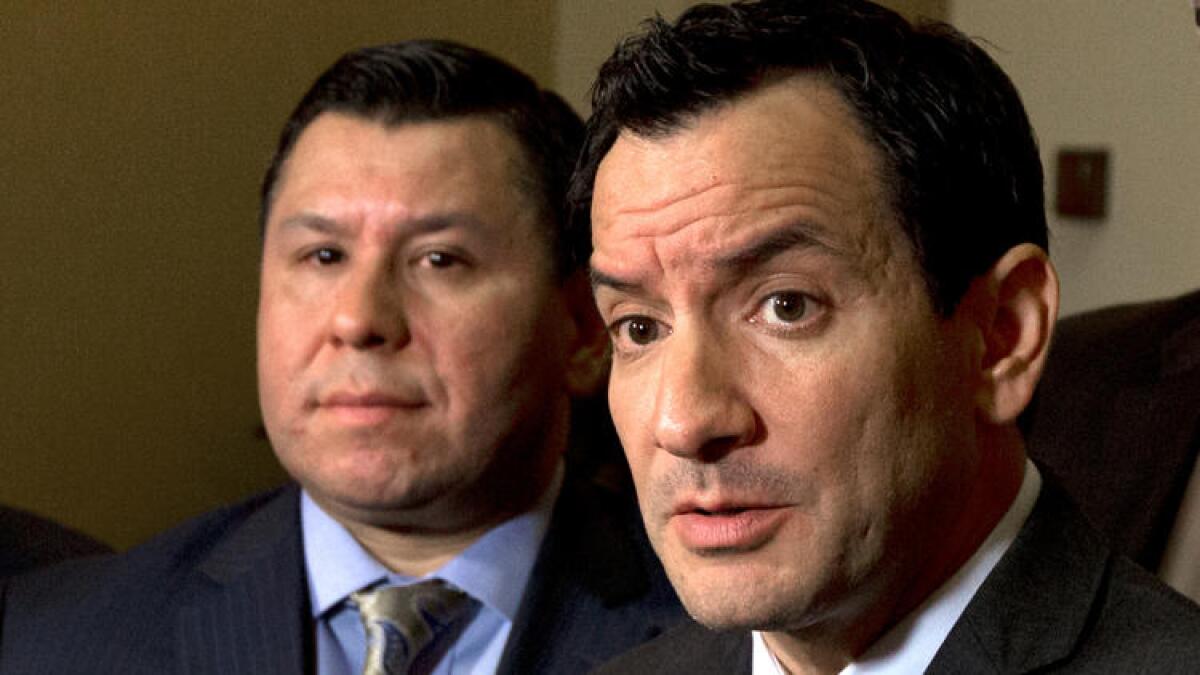
The California Assembly will hold public hearings next month to address sexual harassment in the Capitol, Democratic lawmakers announced Tuesday, as allegations of pervasive mistreatment continue to ripple through Sacramento.
The announcement comes one day after the California Senate announced it has hired lawyers and human resources consultants to investigate allegations of widespread sexual harassment and evaluate Senate procedures.
In a joint statement, Assembly Speaker Anthony Rendon (D-Paramount), Assemblyman Ken Cooley (D-Rancho Cordova) and Assemblywoman Laura Friedman (D-Glendale) said that “sexual harassment of any kind is intolerable.”
The lawmakers say a three-pronged approach is necessary to confront the issue: changing a climate that has been permissive to sexual harassment, offering victims have a safe place to discuss complaints and ensuring that “sexual harassment is dealt with expeditiously and that the seriousness of consequences match the violations committed,” they said in a statement.
Vowing a “comprehensive effort” to address these issues, lawmakers said there will be public hearings in November to discuss how the Legislature can tackle the issue. The panel, tasked to discuss harassment, discrimination and retaliation prevention and response, is chaired by Friedman and was formed in June, though it has not yet met.
The panel is a subcommittee of the powerful Rules committee, chaired by Cooley, which functions as the chamber’s de facto human resources department.
“As we move forward, we must remember that the bottom line is harassers need to stop their abusive actions,” the statement said. “The rest of us need to call out harassment and abuse by its name and stigmatize this behavior each and every single time we see it.”
Adama Iwu, who helped organize the public letter published last week decrying an atmosphere of sexual harassment in the Capitol, said she and some of the women who signed the letter were concerned if any victim would be asked to testify “with no legal guarantee against retaliation.”
“Furthermore, we are concerned about the divergent paths of the Assembly and Senate,” Iwu said in a statement. “It is imperative that we work with outside experts, as part of a public independent review with whistleblower protections, to address the pervasive culture of sexual harassment in the Capitol community.”
Meanwhile, the trade association representing lobbyists, the Institute of Governmental Advocates, said in a statement Tuesday that it “unequivocally supports [the women who signed the letter] and any other person in our Capitol community who has suffered harassment.”
Dates for the hearings, which are expected in late November, have not been set.
- Share via
Recall effort against Sen. Josh Newman still on track after too few voters request to remove their names from petitions
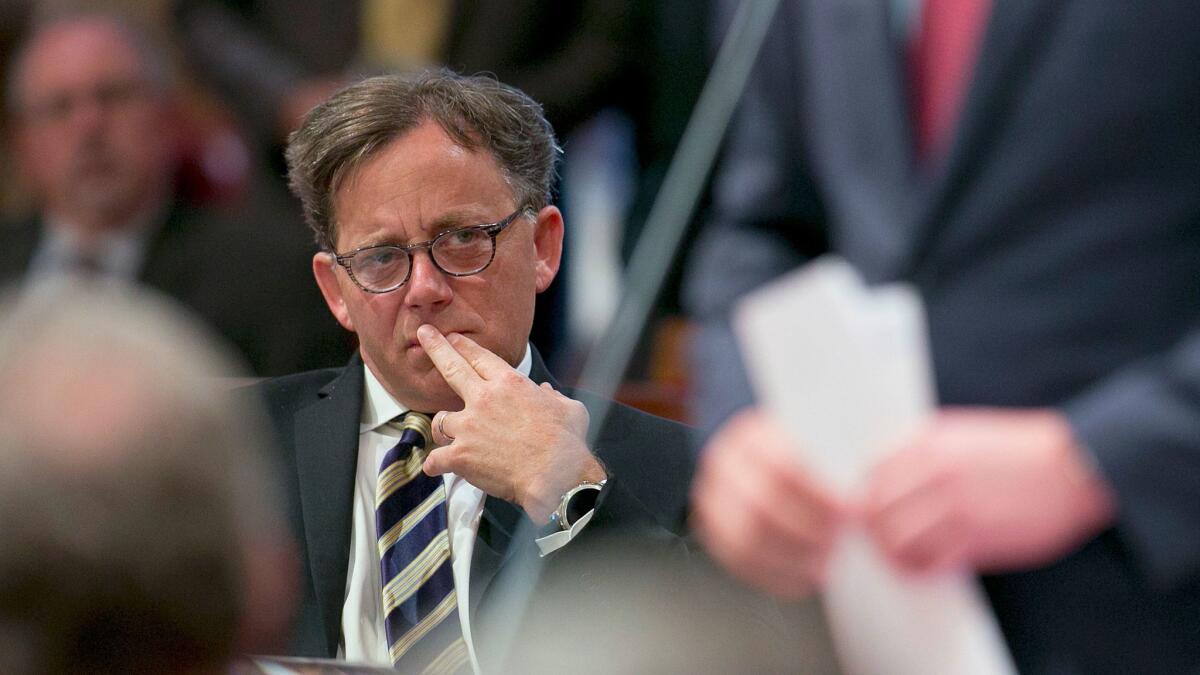
Of the more than 70,600 voters who signed petitions to hold a recall vote on state Sen. Josh Newman of Fullerton, only 849 asked that their signatures be withdrawn by the deadline, clearing a major hurdle for an election on whether to oust the Democratic lawmaker, officials said Tuesday.
Opponents of the recall needed to get more than 7,000 voters to withdraw their signatures to deprive supporters of the 63,593 signatures needed to put the measure on the ballot, under a new system approved recently by the Democratic-controlled Legislature that slows down the process.
“Sen. Josh Newman has spent months lying to his constituents by claiming people were duped into signing the recall petition against him, and with today’s tally, he has been unmasked again as a pathological liar who is unfit to hold office,” said Carl DeMaio, a Republican activist heading the recall drive. “We eagerly look forward to voters having a chance to vote him out for his lies and his decision to increase the gas tax.”
Newman won a close contest last November in a district formerly represented by a Republican. He was targeted for recall by Republican activists for voting in April for a $52-billion transportation plan that raises gas taxes and imposes a new annual vehicle fee. A successful recall would deprive Democrats of a supermajority in the Senate.
Once Secretary of State Alex Padilla certifies that there are sufficient valid signatures based on the data collected Tuesday, the new process calls for him to notify the state Department of Finance, which will be given 30 business days to prepare a cost estimate for the recall election.
Once the estimate is prepared, the Joint Legislative Budget Committee will have 30 calendar days to review and comment on the estimate, said Sam Mahood, a spokesman for Padilla.
On the following business day, the secretary of State will certify to the governor that the recall has qualified for the ballot. That could happen as late as Jan. 11 if the reviews take all the time allotted.
Gov. Jerry Brown must then call an election to be held 60 to 80 days later, or within 180 days if there is a regularly scheduled election within Senate District 29 during that period. There will be a June 2018 primary election for the Assembly districts that make up the Senate District, so Brown could consolidate the Senate recall vote with that state primary.
However, the new, longer process could end up being abandoned if supporters of the recall are successful in a lawsuit alleging the new rules are improper. At the same time, opponents of the recall have filed a lawsuit to block the recall, alleging petition circulators misled voters by saying their signatures would help repeal the gas tax.
“The underhanded methods used to qualify this recall likely represent one of the worst cases of voter fraud in California history,” said Derek Humphrey, a consultant for the Newman campaign. “Now, millions of tax dollars will be wasted to redo an election the Sacramento special interests lost barely a year ago. It’s a shameful waste of money that voters will soundly reject and vote to keep Josh Newman fighting for them in the state Senate.”
- Share via
Kevin De León pledges to sponsor Medicare-for-all bill if elected to the U.S. Senate
- Share via
Rep. Devin Nunes announces investigation into Obama-era uranium deal
House Republicans are opening investigations of the Obama administration’s 2010 decision to approve the sale of American uranium mines to a Russian-backed company, and California Rep. Devin Nunes is at the forefront.
Nunes (R-Tulare), the chairman of the House Intelligence Committee, said at a news conference that his panel and the House Oversight Committee would jointly probe the deal, which President Trump has called “the real Russia story.”
Nunes and other Trump supporters have raised the 7-year-old uranium deal while four congressional committees and Special Counsel Robert S. Mueller III are looking into Russia interference the 2016 election and whether Moscow had any direct links to the Trump campaign.
- Share via
Former deputy director of California tax agency says he was fired for whistleblowing
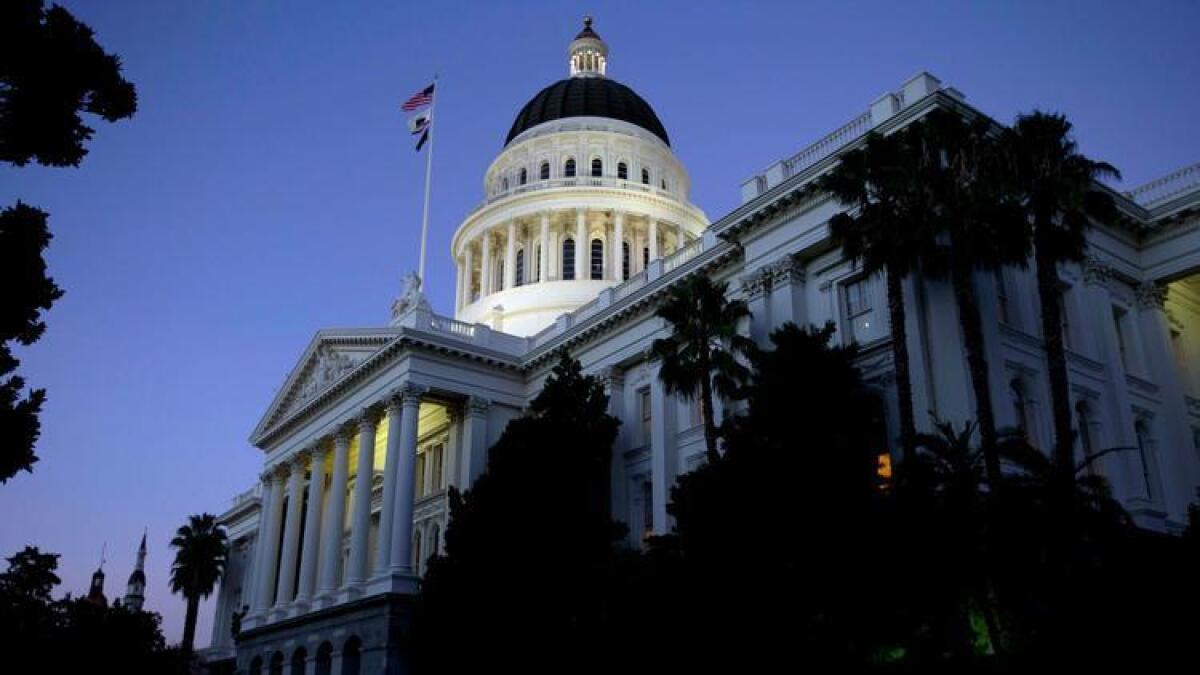
A former deputy director of the state Board of Equalization said Tuesday he was improperly fired this month after cooperating with a state Department of Justice investigation into allegations that agency officials improperly used public resources.
Mark DeSio was fired Oct. 12 as the director for external affairs of the California Department of Tax and Fee Administration, which recently was split off from the board in an agency shakeup. He has filed a whistleblower complaint and appeal to the state Personnel Board seeking reinstatement to his position.
He alleges the agency before its split up was rife with nepotism and that there is improper hiring and use of employees from one fund to instead help elected board members in field offices.
“For more than a year, DeSio gave information about the BOE to the Department of Justice and several state agencies and auditors, right up until the time of his firing,” said a press release from his attorney, Mary-Alice Coleman. “Despite being pressured, DeSio refused to engage in certain activities. DeSio’s job was threatened multiple times during the course of his employment.”
In April, Gov. Jerry Brown called for a Justice Department probe of allegations that employees of the state Board of Equalization misused state resources assigning high-paid tax auditors to tasks such as directing traffic for community events promoting elected board members. Brown also set in motion steps that broke up the agency in June, putting the five-member board in one office, and tax collection and appeal system in two other offices.
At the time, Brown cited “serious problems” of mismanagement identified in a Department of Finance audit of the agency, which is responsible for collecting $60 billion in tax revenue annually.
DeSio said he has also provided information on alleged improprieties to the state Fair Political Practices Commission, which investigates political wrongdoing.
Days before he was notified of his termination, DeSio said he told Department of Justice investigators that the board had “misused” 30 information officer positions as personal staff for board members.
He also said supervisors overruled him when he refused to hire 10 new call center employees from funds not set aside for that purpose. He said 10 people were hired even after Brown had revoked the agency’s hiring power.
DeSio’s complaint alleges that in August 2016, board member Jerome Horton “pressured” DeSio to promote a particular employee who was funded by DeSio’s office, but actually worked in Horton’s office.
When DeSio refused, saying the employee was not the top-scoring candidate, the complaint says Horton became angry and his chief of staff threatened DeSio. Board Executive Director David Gau, the complaint alleges, contacted Desio and “told him to either do what Horton wanted or be fired.”
After meeting with Department of Finance auditors, DeSio said he was contacted by Horton in November 2016. “Horton demanded to know what DOF had asked and what documentation Desio had provided in response.” DeSio said he refused to disclose what he gave the auditor.
“Horton threatened DeSio, saying, ‘I only need one more vote to take you out,’” the complaint alleges.
Horton disputed the allegations.
“If he has filed a complaint, the facts will show that I had an excellent professional relationship with Mr. DeSio and the allegations are not true, I had nothing to do with his termination,” Horton said in a statement.
Gau did not immediately respond to requests for comment.
DeSio also alleged multiple cases of nepotism in the agency. In one example, he alleges agency officials “improperly orchestrated the hiring” of the man whose wife worked for a top manager at the agency.
Updated at 3 pm to include comment from Board member Jerome Horton.
- Share via
Campaign manager for Orange County congressional candidate resigns following sexual harassment allegations
The campaign manager for Orange County congressional challenger Phil Janowicz resigned last week following allegations he had sexually harassed women while working as a top official with the Democratic Party of Orange County.
Erik Taylor, who had worked for Janowicz’s campaign for less than five months, resigned Thursday, according to Janowicz, a Democrat who is running to unseat GOP Rep. Ed Royce in the 39th Congressional District.
In a Facebook statement Friday, Janowicz identified Taylor as a “senior member” of his campaign staff who “vehemently denies the allegations.”
“I await the results of the formal investigation,” Janowicz continued, adding that “sexual harassment and sexual assault have absolutely no place in our society and absolutely no place on a political campaign.”
Janowicz said he first heard about the allegations Tuesday afternoon and called Taylor to ask for an explanation. Janowicz said after that conversation, he immediately asked for Taylor’s resignation, which was finalized Thursday afternoon.
Taylor’s name, along with the name of a prominent Orange County labor leader, was first publicly mentioned in a report from OC Weekly that detailed the allegations by unnamed accusers.
Efforts to reach Taylor were unsuccessful.
The alleged incidents came to light in part through social media posts inspired by the #metoo campaign that has prompted women to share their experiences with sexual harassment. They caught the attention of many Orange County politicos after a post from Danielle Serbin, chairwoman of the Orange County Young Democrats, demanded that party leaders “call out the harassers, name them and shame them, and remove them from positions of power in our community.”
In a statement, the Democratic Party of Orange County said it takes the accusations seriously and promised a raft of changes to its operation, including training for members and volunteers, a code of conduct that applies to all members, staff and volunteers of the party and taking “immediate action” to investigate accusations as they arise.
Elsewhere in California politics, state Senate leader Kevin de León announced Monday that he will hire two outside firms to look into allegations of a widespread culture of sexual harassment in the state Capitol.
- Share via
Gavin Newsom calls for California to nearly quadruple its annual housing production

Gubernatorial candidate Gavin Newsom says California officials should set a goal to help 3.5 million new homes get built by 2025 to stem the state’s housing problems.
“Simply put, we’re experiencing a housing affordability crisis, driven by a simple economic argument,” the lieutenant governor said in a post on Medium outlining his housing plan. “California is leading the national recovery, but it’s producing far more jobs than homes. Providing adequate housing is fundamental to growing the state’s economy.”
To reach that number, which comes from a 2016 analysis by consulting firm McKinsey Global Institute, the state would need to nearly quadruple its annual production of roughly 100,000 new homes a year to 378,000. That amount of new homes in one year hasn’t been built since at least 1954, according to permit data from the construction industry.
Newsom outlined a number of policy changes he’d make including:
- Expand by $500 million the low-income housing income tax credit program to build more affordable homes.
- Allow cities to sequester local tax dollars to help finance new development in certain neighborhoods.
- Link state transportation funding to local governments’ housing growth targets, which cities and cities currently have little incentive to meet.
- Revamp local tax incentives so it makes more financial sense for cities to approve new homes.
- Appoint a homelessness czar.
“There is significant work ahead of us to tackle the housing and homelessness crisis gripping our state,” Newsom wrote in the post. “But I’m committed to turning the tide, because each new unit built and each individual with a place to call their own is one more person who can feel at home in California.”
- Share via
Want the Sierra Club’s endorsement? Here are its standards
The Sierra Club is setting some ground rules for California gubernatorial candidates that may want its endorsement.
No. 1 on the list is independence from the oil industry, which has been a fault line in the Capitol during debates over climate change policies.
“This year, given how important California’s role has become to the nation for leadership on the environment, it made sense to lay out in advance what some of the overall characteristics that the endorsement committee will be looking for in candidates,” said Kathryn Phillips, director of Sierra Club California.
Other requirements include independence from the tobacco and e-cigarette industry and a commitment to public health, environmental equity and transparency.
- Share via
Rent control in California could expand dramatically under a possible 2018 initiative
California’s cities and counties would be able to dramatically expand rent control under a potential 2018 statewide ballot initiative filed Monday.
The initiative would repeal the landmark Costa-Hawkins Act, a 1995 law that barred rent caps on single-family homes and apartments built after that year. If it passes, local governments would be able to implement rent control on newer properties.
“Rent in California is out of control,” Ismail Marcus Allgood, a South Los Angeles resident and a leader with faith-based community organization LA Voice, said in a press release announcing the measure. “I moved here in 2013, and have already moved four times due to my rent being raised. That is just ridiculous. The homeless problem in L.A. is only going to get worse if we don’t repeal Costa-Hawkins right now.”
The Alliance of Californians for Community Empowerment, a nonprofit community organizing group, is the primary backer of the initiative. In a release, the organization said it had the support of major tenant groups up and down the state and Michael Weinstein, the leader of the AIDS Healthcare Foundation. That organization has funded numerous state and local ballot measures, including an unsuccessful effort earlier this year to limit growth in the city of Los Angeles.
Apartment developers and landlords are strongly supportive of the Costa-Hawkins Act, which tenant groups have long fought. Assemblyman Richard Bloom (D-Santa Monica) introduced a bill last year to repeal the law, but he pulled it before a committee hearing, citing stiff opposition. Bloom has vowed to bring back his bill in 2018.
After the proposed initiative receives an official title and summary from the Attorney General’s Office and a financial analysis, organizers will have to decide whether to collect signatures to place it on the November 2018 ballot.
- Share via
California Senate hires investigators to look into sexual harassment allegations
California Senate leader Kevin de León will hire two outside firms to look into allegations of a widespread culture of sexual harassment in the state Capitol.
De León announced Monday he has hired the law office of Amy Oppenheimer to conduct an external investigation into harassment and assault allegations, and the consulting firm CPS HR Consulting to review Senate policies on harassment, discrimination and retaliation.
De León also sent letters to lobbyists in the Capitol community detailing how existing rules protect non-employees.
“There’s always more employers can do to protect their employees,” De León said in a statement. “Everyone deserves a workplace free of fear, harassment and sexual misbehavior and I applaud the courage of women working in and around the Capitol who are coming forward and making their voices heard.
The women behind an open letter sent last week calling out a “pervasive” culture of mistreatment in the political industry said that De León’s actions were insufficient.
More than 140 women, including legislators, Capitol staff, political consultants and lobbyists, signed the letter.
“To find the truth and rebuild trust, we need a truly independent investigation, not a secretly hand-picked self-investigation,” said Adama Iwu, a government affairs director for Visa who spearheaded the campaign. “We need full transparency. How was this firm selected? Who will they report their findings to? What exactly are they investigating? Is the Assembly involved?”
Meanwhile, the women who have signed the letter, who have coalesced into a group called “We Said Enough,” announced they were formalizing their advocacy efforts on Monday by launching a nonprofit organization.
The group plans to hold forums to “outline a plan of action for improving how harassment and abuse complaints are reported, investigated and addressed.”
- Share via
Kevin de León has millions in state campaign accounts that can’t be rolled over to his Senate race
State Senate leader Kevin De León has millions of dollars socked away in state campaign accounts, but federal law prohibits him from rolling over the money into his federal campaign for the U.S. Senate.
So what options does the Los Angeles legislator have as he puts together a campaign to unseat Sen. Dianne Feinstein, a fellow Democrat, in next year’s election?
- Share via
Candidates for California governor debate whether single-payer healthcare is right for the state

The top four Democrats running for California governor stood onstage Sunday for the first major candidate forum, splintering over single-payer healthcare but little else.
The divide on healthcare mirrored the conflict within the Democratic Party both nationally and in California, with progressives — including those who backed Vermont Sen. Bernie Sanders for president — aggressively pushing for universal healthcare while moderates and establishment party members want to plot a more deliberative, cautious course.
On almost every other issue, from immigration to making housing more affordable in California, the four gubernatorial candidates aligned on Sunday. They remained cordial throughout the 90-minute exchange, taking only a few subtle digs at one another that would probably go unnoticed by voters paying only casual attention to the race.
The candidates each called for an increase in coverage for mental health and for holding healthcare companies more accountable. They threw sharp jabs at the Trump administration, vowing to take legal action to shield immigrants in California.
- Share via
Gov. Jerry Brown heads to Washington to talk about the threat of nuclear war
- Share via
Watch: California’s Democratic candidates for governor discuss healthcare issues in Anaheim
California Democratic gubernatorial candidates John Chiang, Delaine Eastin, Gavin Newsom and Antonio Villaraigosa are in Anaheim to discuss healthcare issues at a forum hosted by the National Union of Healthcare Workers.
The candidates will be asked questions by Times reporter Melanie Mason along with Bob Butler of KCBS radio, Maria Paula Ochoa of Telemundo and and Jeff Horseman of Southern California News Group. The event will be moderated by ABC News correspondent John Donvan.
- Share via
California Politics Podcast: What happens next in Sacramento’s discussion of sexual harassment is important
There’s a big, challenging question beyond the initial shock of sexual harassment stories told by women working in California politics: What happens next?
On this week’s California Politics Podcast, we discuss the allegations that have emerged from an open letter first reported by The Times on Tuesday. And a key part of the next chapter is how legislative leaders and the state’s major political parties respond to the concerns raised in the letter signed by more than 140 women.
We also take a closer look at the new effort by wealthy activist Tom Steyer to demand impeachment proceedings against President Trump, and whether the San Francisco Democrat is thinking seriously about jumping into the U.S. Senate race.
And with Gov. Jerry Brown’s action on hundreds of bills complete, we offer up a few notable decisions in those final signings and vetoes.
I’m joined by Times staff writer Melanie Mason and Marisa Lagos of KQED.
- Share via
Sen. Tom Cotton chides Californians: ‘Your sanctuary cities weren’t enough, you had to have a sanctuary state instead’
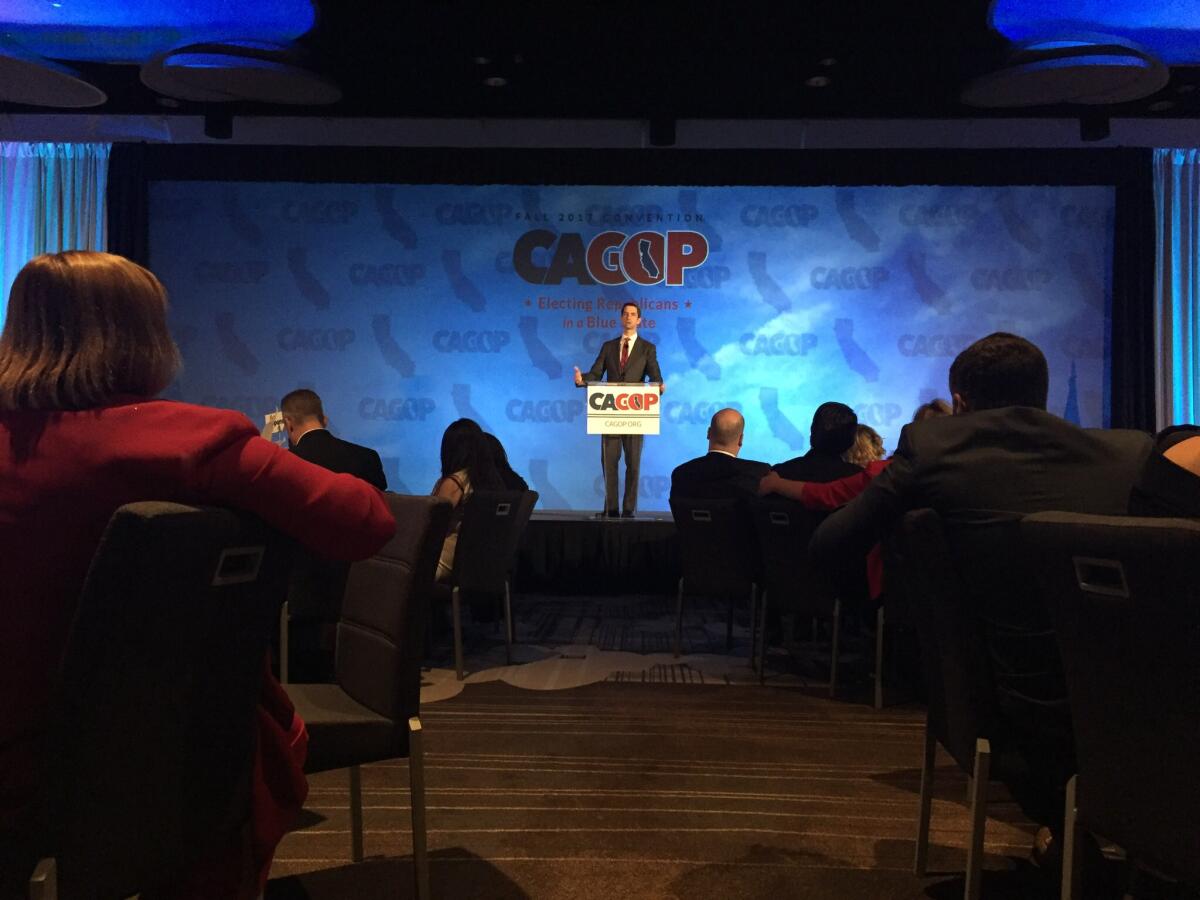
Arkansas Sen. Tom Cotton told California Republicans they should expect better days ahead, in part, because of liberal overreach by California Democrats on taxes, immigration and other issues affecting the daily lives of working-class Americans.
Cotton invoked the memory of former president and California governor Ronald Reagan as a guiding light, and ridiculed House Minority Leader Nancy Pelosi (D-San Francisco) as a harbinger of doom.
“All it takes is a little new thinking applied with old principles. The principles of Ronald Reagan,” Cotton told a packed ballroom at the California Republican Party’s fall convention in Anaheim on Saturday.
Cotton’s keynote address hewed toward traditional conservative themes and was peppered with light moments and witty jabs about the Democrats’ grip on California politics.
“When Jerry Brown has to veto your legislation because it’s too liberal, you might have to take a look in the mirror,” Cotton told the crowd.
It was a big departure from the speech the night before by GOP firebrand Steve Bannon, President Trump’s former political strategist.
Bannon unleased attacks on former President George W. Bush and Sen. John McCain (R-Ariz.). He told Republicans they needed to rise up in California or else the progressive left and “lords of the Silicon Valley” would try to secede from the union in 10 to 15 years.
Cotton, who at 40 is the youngest member of the U.S. Senate, is widely believed to be eyeing a run for higher office. During the 2016 Republican National Convention, he was the most active politician on the breakfast circuit, visiting the South Carolina, Ohio, Iowa, New Hampshire and California delegations.
California, of course, is home to more than 5 million Republican voters and has been a wellspring of political cash for GOP presidential candidates.
Cotton’s message of hope has been a running theme throughout the three-day GOP gathering as the state party tries once again to turn things around in left-leaning California. The party’s share of the state electorate has fallen to 26% and no Republican has been elected to statewide office since 2006.
Cotton, however, told the party faithful to remain upbeat. California’s Republican members of Congress play a pivotal role in Washington, and there are ample opportunities to rekindle the party’s presence in Sacramento and throughout the state.
Cotton zeroed in on the new gas tax and vehicle fee hike in the state, which would raise $5.2 billion annually for transportation and mass transit improvements, saying it would hurt ordinary Californians.
“If you live in West L.A. or San Francisco and you have the money to afford a Tesla, maybe you’ll be OK,” Cotton said. “What about the farmer in the Central Valley who has a pickup truck and needs to fill it up three times a week?”
He also took shots at the so-called sanctuary state law signed this month by Gov. Jerry Brown, which will limit law enforcement agencies from questioning and detaining people for immigration violations.
“Your sanctuary cities weren’t enough, you had to have a sanctuary state instead,” Cotton said. “So all your citizens will face greater danger no matter where they live.”
Before he took the stage, the state GOP played a short video introduction of the Arkansas senator, focused on his experiences serving as an Army officer in Iraq and Afghanistan.
In Washington, Cotton was a harsh critic of President Obama and is considered a hawk on national defense. During a hearing in June, Cotton also openly mocked the idea of the Trump administration colluding with Russia.
- Share via
House Majority Leader Kevin McCarthy criticizes Gov. Brown, lauds Trump at California GOP convention
House Majority Leader Kevin McCarthy (R-Bakersfield) on Saturday blasted Gov. Jerry Brown over Democrats positioning the state as the liberal resistance to President Trump and for legislative efforts to circumvent the president’s policies.
Brown, he warned, could be viewed similarly to southern governors who sought to “pick and choose” which federal laws to uphold during the civil rights era. He focused on Brown’s recent signing of a bill to make California a so-called sanctuary state, which will limit law enforcement agencies from questioning and detaining people for immigration violations.
“I don’t think history will be very kind to Gov. Brown,” McCarthy told a few hundred delegates and guests at a luncheon at the California Republican Party convention in Anaheim.
California is a critical part of Democrats’ efforts to retake the House of Representatives, with a focus on seven Republican-held districts that Hillary Clinton won in the 2016 presidential election. Only one of the Republican representatives of those targeted districts had appeared at the convention as of Saturday afternoon, Rep. Mimi Walters of Irvine.
McCarthy said Vice President Mike Pence raised $5 million for the efforts to protect the seats during a recent three-day fundraising trip through California, but he did not otherwise go into detail about the congressional battle expected in 2018.
He instead lashed out at Republican members of the state Legislature who voted for Democratic policies.
“My advice to those Assembly members in Sacramento: You will not win a majority by thinking you’ll be Democrat-light. You will win the majority by showing the differences in the party,” McCarthy said. “You will not win the majority by voting against your own principles on a Democratic policy, and let Democratic targets vote no. You will not win the majority if you’re concerned about being able to stand behind a podium with a Democratic governor instead of giving the freedom to Californians across this entire state.”
McCarthy did not name the members he was speaking about, but it was clear he was referring to Assemblyman Chad Mayes (R-Yucca Valley) and other Republicans who voted for an extension of the state’s cap-and-trade program this year. Mayes stepped down as Assembly Republican leader under pressure from others in his party who were upset over his vote for the climate change program, which requires companies to purchase permits to release greenhouse gases.
McCarthy spoke a day after former Trump White House advisor Stephen K. Bannon addressed the group. Bannon has declared “war” on the GOP establishment, of which McCarthy is a member. McCarthy did not push back at Bannon’s remarks, which included criticism of former President George W. Bush and Sen. John McCain (R-Ariz.).
Rather, McCarthy lauded Trump’s vision, compared him to former President Reagan and pointed to economic gains and regulatory reform since Trump took office.
“What a difference nine months and one election makes,” McCarthy said. “What a difference: A man who ran for president on issues and keeps his word and actually enacts the things he promised to do.”
Trump has tried to enact many of his campaign promises but has been unsuccessful on several priorities, including a travel ban on citizens from Muslim-majority countries and a repeal of the Affordable Care Act.
Tax reform is the latest priority on the Republicans’ agenda, and McCarthy promised that Congress would push a package by Thanksgiving that includes lowering rates for small businesses and corporations, and simplifying the tax code from seven income tax brackets to three. He also spoke out in support of one of the more controversial parts of the proposal: eliminating the deduction of state and local taxes.
“I don’t think it’s fair for somebody else to subsidize poor management in California,” McCarthy said. “Look at the entire [tax reform] bill when it comes out, you will pay less. But no longer can Sacramento say, ‘I’m going to raise the rates just because I’ll have the federal government subsidize it.’ They will have to be held accountable for when they want to raise taxes.”
- Share via
John Chiang endorsed for governor by San Diego Assemblywoman Lorena Gonzalez Fletcher
- Share via
Gold Star father Khizr Khan, who clashed with Trump during the election, goes after him again in California
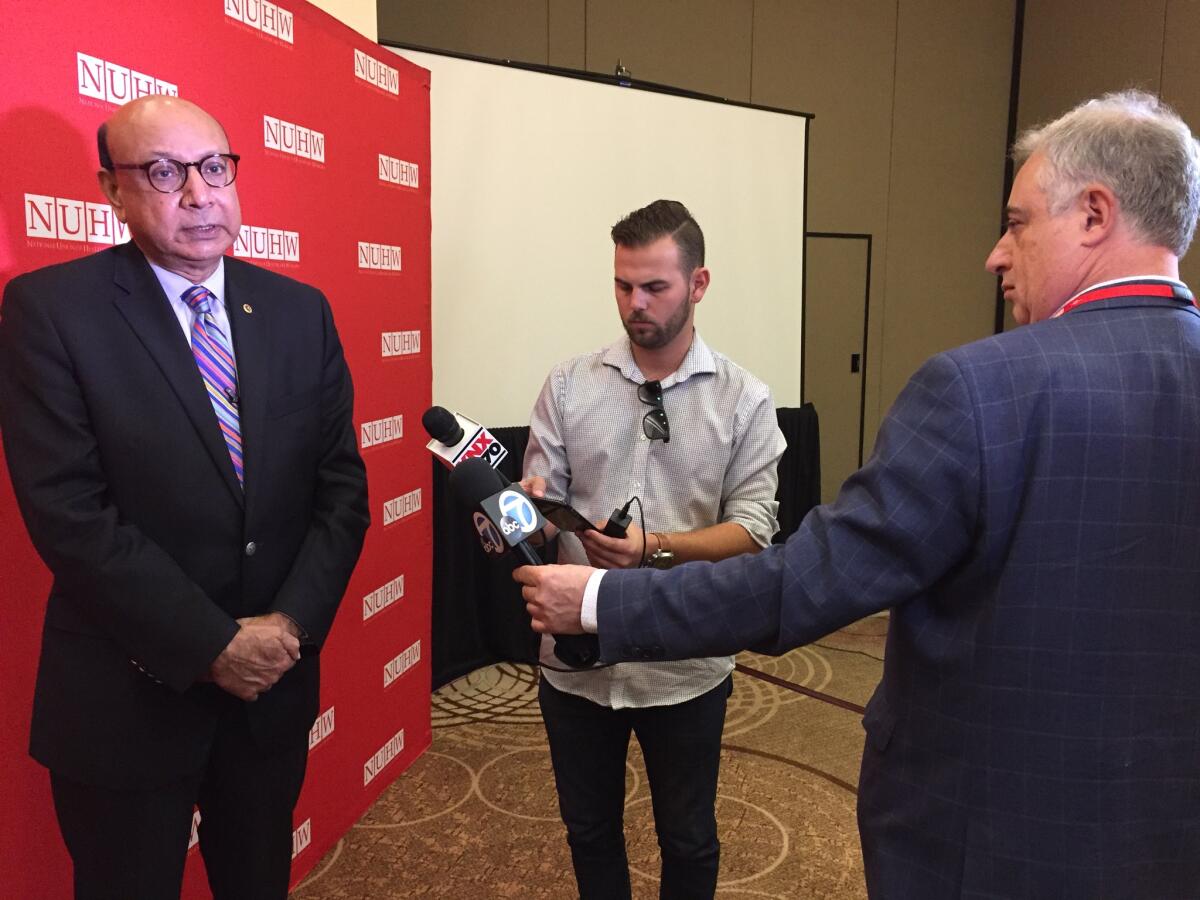
Khizr Khan, the father of a Muslim U.S. Army captain killed in Iraq who feuded with Donald Trump during the 2016 presidential campaign, on Saturday criticized the Trump White House for its clash with a widow of a fallen soldier this week.
Khan, speaking to reporters after addressing a National Union of Healthcare Workers conference in Anaheim, said the families of all military members killed in combat deserve to be treated with dignity and respect, especially in the days and weeks immediately following the death of their loved one.
“It was disappointing to see the behavior of [the White House],” Khan said, before criticizing Trump administration officials for standing “in front of the cameras and providing a defense for the indefensible behavior.”
Khan’s comments came just days after the uproar over Trump’s call to the widow of Army Sgt. La David T. Johnson of Florida, one of four U.S. soldiers who died in an Oct. 4 ambush in Niger.
Rep. Frederica S. Wilson of Florida was with Johnson’s wife, Myeshia Johnson, in a car when the widow took Trump’s call on speakerphone. Wilson publicly described Trump’s comments as insensitive, saying he suggested that the sergeant knew what he was getting into when he joined the Army.
White House Chief of Staff John F. Kelly, whose son was killed in combat, defended the president’s comments, saying that he advised Trump on what to say and that the president was trying to praise Johnson’s unselfish military service as well as offer words of comfort to his widow.
Khan avoided attacking Trump directly or expanding on his remarks, saying he will address the controversy in more detail after Johnson’s memorial services.
The clash between Khan and Trump ignited after Khan’s speech at the 2016 Democratic National Convention in Philadelphia. There, Khan ripped into Trump, then the Republican nominee for president.
“Hillary Clinton was right when she called my son ‘the best of America.’ If it was up to Donald Trump, he never would have been in America,” Khan said at the convention. “Donald Trump consistently smears the character of Muslims. He disrespects other minorities — women, judges, even his own party leadership. He vows to build walls and ban us from this country.”
Trump responded by questioning whether Khan’s wife, who stood by her husband’s side during the couple’s high-profile appearance, was silent because of her Muslim faith. The controversy ignited by Trump’s jabs at a Gold Star family dragged on for days, and he drew rebukes from Sen. John McCain (R-Ariz.), House Speaker Paul D. Ryan (R-Wis.) and Senate Majority Leader Mitch McConnell (R-Ky.).
During his speech to the healthcare union Saturday, Khan lamented the loss of “civility” in national political discourse and pointed squarely at the president. He said the current White House has “sown division” by attacking immigrants and belittling political rivals.
- Share via
California Teachers Assn. votes to endorse Gavin Newsom for governor

The politically influential California Teachers Assn. on Saturday endorsed Democratic Lt. Gov. Gavin Newsom for governor, praising his support for public schools and his promise to hold charter schools more accountable.
“Gavin has long supported increased funding for education and is committed to making investing in students a top priority as governor,” CTA President Eric Heins said in a written statement Saturday. “He supports a public education system that attracts, not attacks, teachers, universal preschool and affordable college for all.”
The move is not entirely surprising given the antagonism between one of Newsom’s top Democratic rivals, former Los Angeles Mayor Antonio Villaraigosa, and teachers unions in California.
Villaraigosa launched his career as a union organizer, including for United Teachers Los Angeles, and labor played a critical role in getting him elected to office. But after he tried to gain control of Los Angeles schools, he questioned policies fiercely guarded by teachers unions, such as seniority protections that resulted in regular layoff notices to younger teachers who tend to staff the most challenging schools. He grew to support using student test scores to evaluate teachers and other overhauls opposed by union leaders.
Villaraigosa, who eventually gained control of more than a dozen struggling city schools through a nonprofit, ultimately blasted the city’s teachers union where he once worked as “the largest obstacle to creating quality schools.”
The teachers association also passed over Democrat Delaine Eastin, a long-shot candidate who jumped into the 2018 governor’s race last year. Eastin, who served as California’s state superintendent of public instruction, has vowed to put education at the forefront of her campaign.
The key question going forward is how much CTA plans to invest in the governor’s race and how it plans to spend it. In 2014, the union spent $12 million to defeat Marshall Tuck, a huge sum in an obscure race to be state superintendent of public instruction. A Democrat and former charter school leader, Tuck was hired by Villaraigosa to run the nonprofit that oversaw his schools.
Tuck, who narrowly lost his race in 2014 against an incumbent, is running for state superintendent again in 2018. CTA on Saturday also endorsed his opponent, Assemblyman Tony Thurmond (D-Richmond).
- Share via
Republican Justin Fareed jumps into race (again) to oppose Rep. Salud Carbajal
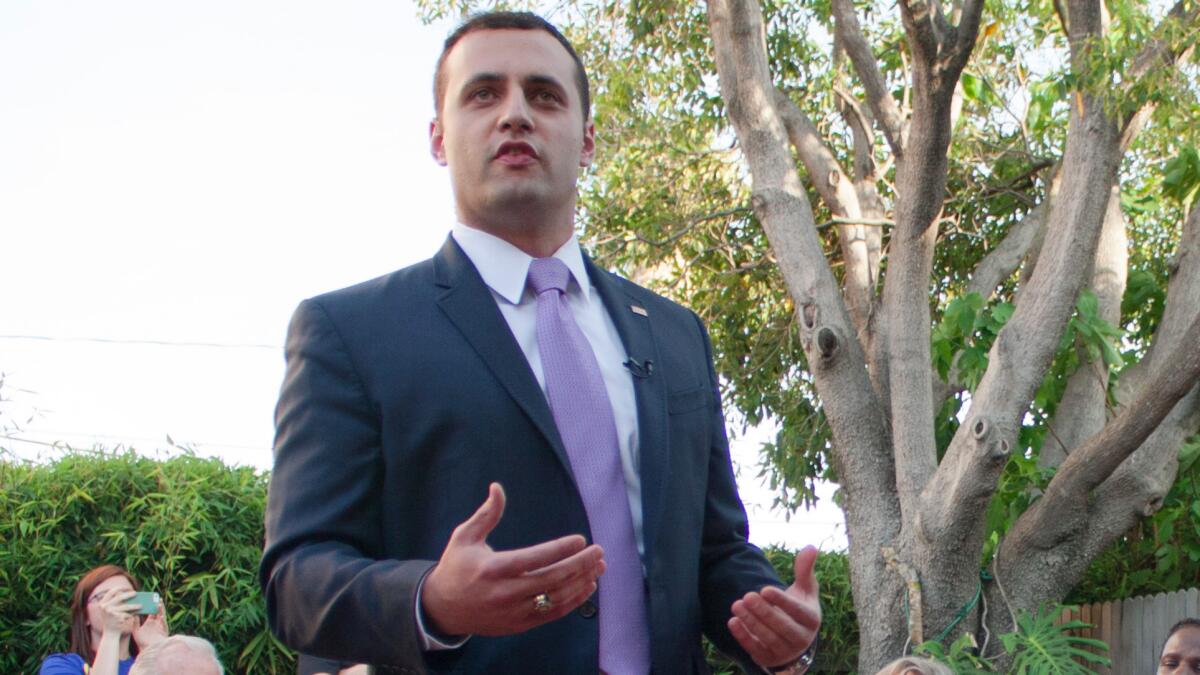
Republican Justin Fareed announced Saturday that he will make a third run for Congress.
Fareed, 29, lost by nearly 7 percentage points last year to Democrat Salud Carbajal in the 24th Congressional District. It was one of the most expensive House races in the state. He also ran in 2014, but did not make it past the primary.
Speaking to supporters at a restaurant in Santa Barbara, Fareed called Carbajal “at best ... an ineffective politician.”
“He gave us lip service last cycle. He said that he will work across the aisle, that he will work in a bipartisan way,” Fareed said, noting that Carbajal had voted with House Minority Leader Nancy Pelosi “more than 97% of the time.”
Fareed’s announcement came days after he reported raising more than $215,000 for his campaign.
During his campaign last year, Fareed described himself as a “third-generation cattle rancher” and vice president of his family’s company, ProBand Sports Industries, which makes medical devices to treat repetitive stress injuries.
In a statement, Democratic Congressional Campaign Committee spokesman Drew Godinich said Fareed’s previous failed runs show he doesn’t have the “values that families of California’s 24th District are looking for.”
“The people of this community know Salud Carbajal’s record of defending our healthcare and fighting for good paying jobs,” Godinich said.
- Share via
Bannon rallies college Republicans at California GOP convention: ‘You guys are the cutting edge’
Former Trump advisor Stephen K. Bannon stopped by a gathering of college Republicans in Anaheim on Friday night, telling them it was up to their generation to right the nation’s course.
“You guys are the cutting edge. You’re the vanguard,” he told a crowd of students gathered at a cigar reception at the California Republican Party’s fall convention. “The millennial generation, you guys are the next greatest generation.”
Bannon spoke to the students shortly after addressing about 500 delegates and guests as the keynote dinner speaker at the state GOP gathering. He told them they must continue the movement started by President Trump and others.
“I couldn’t be prouder to be a small part of this revolution. But on your shoulders, it’s going to happen or not. It’s not Trump, it’s not me, it’s not Laura Ingraham, it’s not Sean Hannity. It’s going to be you guys,” he said. “If you ever need any help … track me down. I’ve got your back the entire time.”
Bannon was mobbed by students seeking pictures and autographs on his way out.
- Share via
Bannon’s mention of Sen. John McCain, George W. Bush draws boos at California GOP convention

Former Trump White House advisor Stephen K. Bannon ripped into former President George W. Bush and Arizona Sen. John McCain Friday night at the California Republican Party Convention in Anaheim, saying “there has not been a more destructive presiden
Mere mentions of former President George W. Bush and Sen. John McCain (R-Ariz.) drew loud boos and catcalls as former Trump advisor Stephen K. Bannon derided the GOP leaders in his address to California Republicans on Friday night at their fall convention in Anaheim.
Bannon, who runs the far-right website Breitbart News, blasted Bush for his harsh assessment of Trump and his policies, which the former president delivered at a policy seminar in New York on Thursday. Bush suggested that Trump has promoted bigotry and falsehoods, violating this country’s values.
“President Bush to me embarrassed himself. Speech writers wrote a highfalutin speech,” Bannon said. “It’s clear he didn’t understand anything he was talking about. … Just like it was when he was president of the United States.”
Bannon, who was ousted from the White House in August but said he considers himself Trump’s “wingman,” didn’t stop there. He ripped into Bush, saying he allowed China to grow as a world power under the premise that global engagement might shepherd the county toward democracy.
“There’s not been a more destructive presidency than George Bush’s,” Bannon said.
Bannon also had no love for McCain, who has openly clashed with Trump and helped torpedo Republican efforts to repeal the Affordable Care Act.
He praised McCain’s military service, but said as a politician, “He’s just another senator from Arizona.”
The boos from the crowd of Republican donors and activists show how much the state party has changed as its influence has waned and its numbers have dwindled in California. The brand of conservatism belonging to Bush and McCain resonated with California’s GOP voters during their presidential campaigns. Both men forged deep ties with the state’s Republican elected leaders and donors, raising tens of millions of dollars here for their political campaigns.
In California, Bush received 1.1 million more votes in the November 2004 presidential election than Trump did last November. McCain received almost 600,000 more votes in the November 2008 presidential election than Trump received in the state in 2016.
- Share via
College journalists say covering Bannon at GOP convention prepares them for Yiannopoulos on campus
Student journalists Amy Wells and Brandon Pho from Cal State Fullerton teamed up outside Anaheim’s Marriott Hotel as night descended, assigned to cover Stephen K. Bannon’s speech and protesters targeting him.
“We don’t underestimate how movements can pull in more youth, especially if they hear other youth pushing it on social media,” said Pho, a sophomore majoring in journalism.
“We’re always on the lookout for more policy to dig into because we have a lot of undocumented students on our campus and they’re way aware of national issues,” added Wells, a senior pursuing a journalism degree.
Pho and Wells said reporting on the small crowd of protesters will prepare them for much larger turnouts when provocateur Milo Yiannopoulos visits their campus at the end of this month.
“While Bannon is more provocative, he doesn’t have the reach of someone like Milo who knows how to engage an online audience,” said Pho, 19. “We learn from watching how different public figures do outreach.”
Wells, 22, described the night’s gathering as having “the feel of a college campus protest. And of course, that feels familiar, with people here maybe figuring out what to do next. Small steps.”
- Share via
Indivisible members rally ahead of Stephen K. Bannon’s speech to California Republicans
Growing up as a Republican in Southern California, Michelle Fowle said she automatically registered to join the party because her parents were also members.
“I didn’t know the right civics,” recalled the Northridge activist, 50. “I didn’t really know women died for the right to vote. I just voted for whoever I saw on signs, or whose names I remembered.”
Now Fowle is the founder of The Resistance - Northridge, Indivisible, which united supporters outside the California GOP convention in Anaheim on Friday to protest an appearance by Stephen K. Bannon.
She joined a crowd of about 50 people across the street from the Anaheim Marriott on Friday night as they denounced President Trump’s former advisor. They were separated from conventiongoers by metal barriers and a cordon of private security guards while police officers observed from nearby.
“Information and exposure and understanding show us that he is dangerous. He’s a very, very good manipulator,” Fowle said of Bannon. “His goal is to try and get rid of established Republicans and bring in more extreme people. Bannon is using whatever base Trump has left to recruit.”
Carolyn Criss, a retired film industry researcher, drove from Sherman Oaks to protest.
“Bannon is a clear danger to our democracy,” she said.
Criss said Trump’s election awoke her dormant activist tendencies, and she now regularly attends protests against the president.
She said she thought Bannon’s visit was an effort to “amplify his voice” while also helping the GOP raise money.
“I really hope the GOP just wants to make some money off him and doesn’t believe what he says,” she said.
- Share via
Small protest gathers ahead of Steve Bannon speech at California GOP convention
- Share via
California Republicans kick off state party convention in Anaheim
- Share via
California lawmaker plans to introduce legislation to protect workers who exercise right to free speech

A California lawmaker plans to introduce legislation that would help protect workers from employer retribution for exercising their right to free speech.
Sen. Henry Stern (D-Canoga Park) said Friday that the state should be a sanctuary for free speech, including the kind that some might find offensive. He said he will introduce a measure when the Legislature is back in session in January.
“It doesn’t matter if you’re Ben Shapiro speaking at UC Berkeley, a brave female employee standing up to misogyny in her workplace through the #MeToo movement, or a Dallas Cowboy playing in California this Sunday,” he said in a statement. “The Constitution does not limit speech based on value judgments so long as it doesn’t harm others.”
Stern said the president’s attempt to urge NFL owners to fire players who kneel during the National Anthem is a “troubling attack” on the 1st Amendment.
“The Constitution trumps Trump,” he said. “Americans of all political stripes ought to stand up and defend it.”
The legislation would also help public institutions fund security for events that could include offensive speech. Public institutions and law enforcement shouldn’t have to bear the cost of ensuring constitutional protections for such events, Stern said.
Stern, a member of the Senate Judiciary Committee, is part of the ongoing work to define hate speech and find a way to address it while upholding the Constitution.
- Share via
Lt. Gov. Gavin Newsom fights NRA over gun control law in federal court
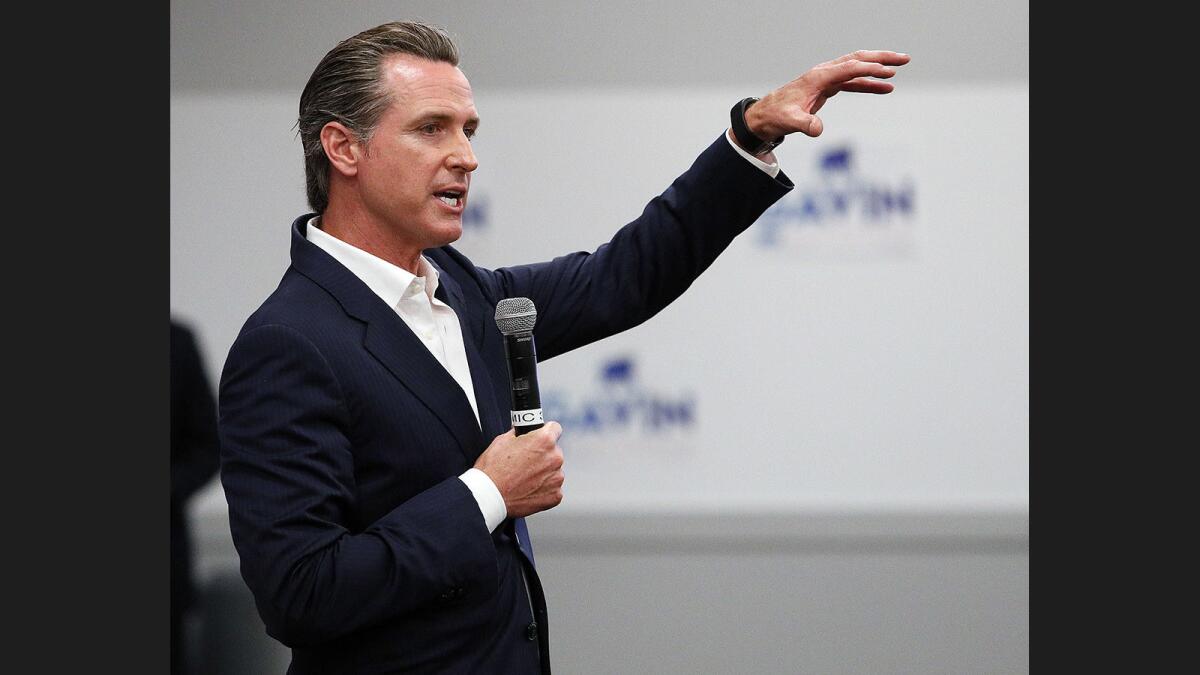
Lt. Gov. Gavin Newsom has asked the courts to lift an order that blocks California’s ban on large-capacity ammunition magazines, which was approved in November by voters when they passed Proposition 63.
In June, a federal judge in San Diego ruled in favor of a request by the National Rifle Assn. to temporarily delay the magazine ban until the court could make a final decision on the law.
U.S. District Judge Roger T. Benitez wrote then: “If this injunction does not issue, hundreds of thousands, if not millions, of otherwise law-abiding citizens will have an untenable choice: become an outlaw or dispossess one’s self of lawfully acquired property.”
In a friend-of-the-court filing, Newsom and the Giffords Law Center to Prevent Gun Violence argued the ban on large-capacity magazines is needed “to help prevent the occurrence of high-fatality gun massacres, and to reduce the bloodshed when these tragedies occur.”
Newsom, a candidate for governor, sponsored Proposition 63 with the law center.
“It’s a tragic reality that as time passes, we are presented with more and more evidence on the devastating power of large-capacity magazines, which are consistently the accessory of choice in mass shootings for mass murderers,” Newsom said Friday in a statement, predicting the federal courts would uphold the ban.
- Share via
State GOP leader says the new gas tax and high poverty rate make Democrats vulnerable in California
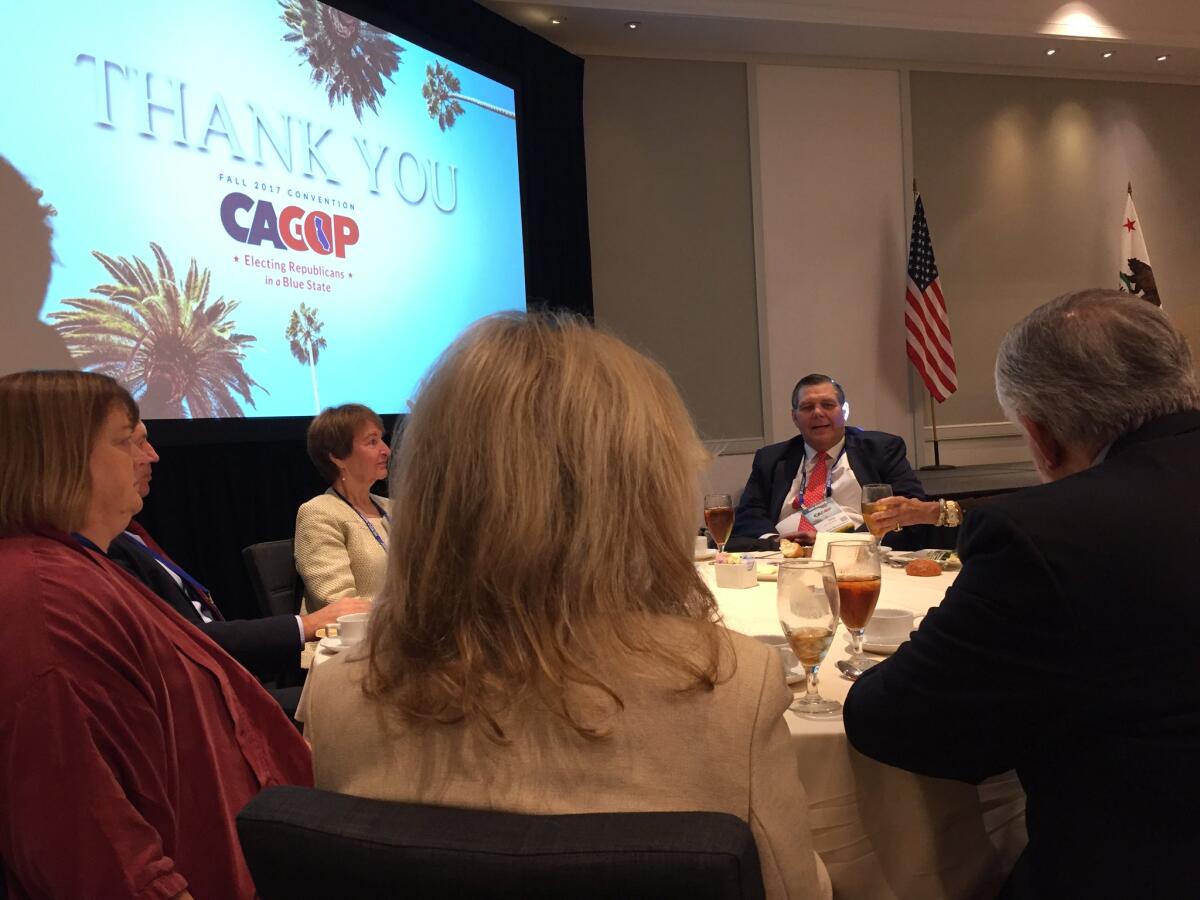
California Republican Party Chairman Jim Brulte kicked off the state GOP’s fall convention with a speech to delegates that outlined why he thinks Democrats will be vulnerable in the upcoming 2018 elections.
Brulte zeroed in on the new gas tax and policy declaring California a “sanctuary state” — both approved by Gov. Jerry Brown and the Democratic-controlled Legislature and both, he said, unpopular with California voters.
He said Democrats have tried to deflect voter attention from these issues, as well as California’s high poverty rate and an uptick in crime, by continually attacking President Trump.
“Here in California, the reason they want to talk about Donald Trump is because they don’t want to talk about the record they created,” Brulte said. “They broke it. They own it. If Donald Trump were not president, we would still have 22% of Californians living below the poverty line. That’s not Donald Trump’s fault. That’s the Democrats who control California.”
The state GOP’s three-day convention at the Anaheim Marriott will kick off in earnest Friday night when Trump’s former political strategist, Steve Bannon, takes the stage for a keynote address to delegates.
- Share via
Nancy Pelosi says she needs to stay on as Democratic leader so there is a woman at the table
House Minority Leader Nancy Pelosi said Friday she needs to keep her leadership position so there is a “top” woman at the table when decisions are made.
Pelosi made the comment on ABC’s “The View” while recounting being interrupted by Cabinet officials during a recent White House dinner with President Trump and Senate Minority Leader Charles E. Schumer (D-N.Y.).
“I was the only woman at the table, and that’s why I have to stay there, to be one of the top women, top people, at the table,” she said.
WATCH: House Minority Leader Nancy Pelosi talks to the L.A. Times >>
The Democrat from San Francisco previously said she was considering retiring if Hillary Clinton won the presidency. She said Friday she stayed in order to protect the Affordable Care Act, President Obama’s signature healthcare law.
Pelosi, who has been in Democratic leadership since 2001 and was the first female House speaker, has faced calls to step aside to make way for a new generation of leaders. Among those calling for her to step aside is fellow Californian Rep. Linda Sanchez of Whittier.
Pelosi on Friday brushed aside a question about calls for new leadership from “The View” panelist Meghan McCain, saying that while a few Democrats want her to go, many others want her to stay.
Earlier this week, Pelosi told The Times, “I don’t want to be dismissive of this, but I’m not worried about it.”
- Share via
Far-right blogger Chuck C. Johnson gave bitcoin donation to Dana Rohrabacher
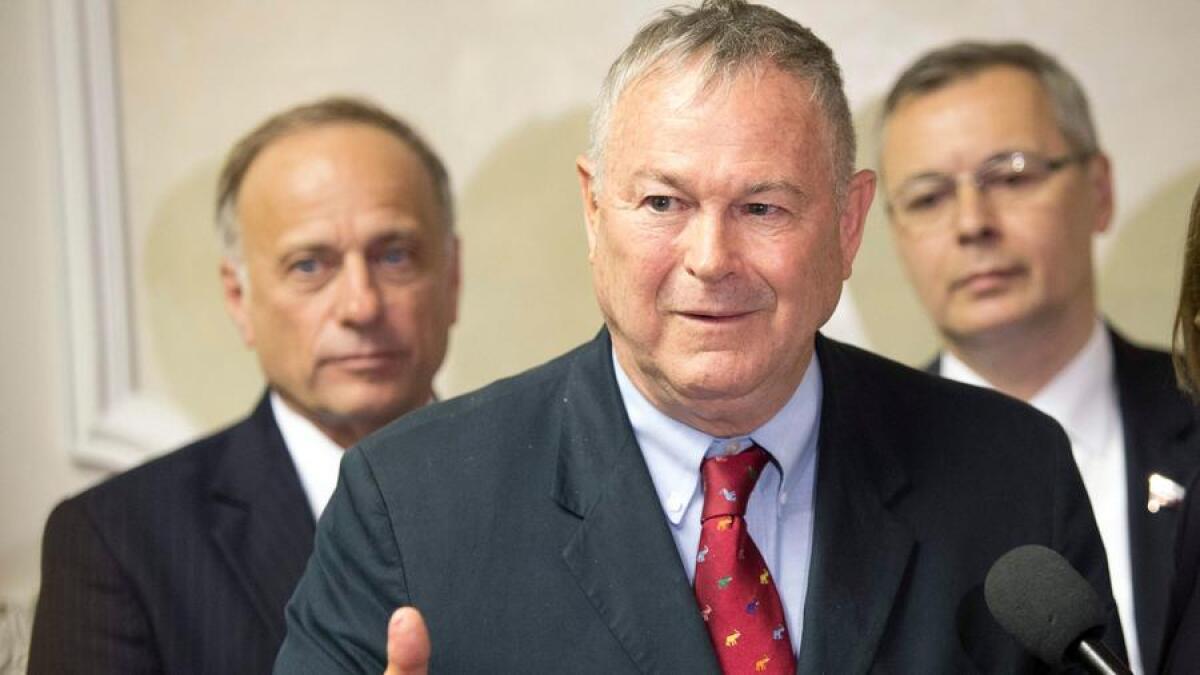
Right-wing blogger and provocateur Chuck C. Johnson gave Rep. Dana Rohrabacher (R-Costa Mesa) a $5,400 campaign contribution weeks after he said he helped arrange a meeting between the Orange County congressman and Wikileaks founder Julian Assange.
The donation, the maximum amount allowed by law, came in the form of bitcoin, a virtual currency.
Johnson, who previously was banned from Twitter after soliciting donations toward “taking out” a prominent black activist, is listed on campaign finance forms as a self-employed investor who lives in Rosemead.
Rohrabacher campaign spokesman Jason Pitkin confirmed the donor was the same person who helped arrange the Assange meeting.
Johnson also recently sat in on a meeting between Rohrabacher and Kentucky Sen. Rand Paul in the Capitol. Pitkin said they discussed Assange’s legal situation and cannabis policy, among other things.
Rohrabacher previously said Assange had “emphatically stated that the Russians were not involved” in hacking the 2016 elections but claimed his plans to bring the information directly to President Trump have been thwarted by White House staffers.
Pitkin said Johnson approached the Rohrabacher campaign shortly after his trip to London and said he wanted to donate. “He said, ‘Do you take bitcoin?’ and I said, ‘I think we can,’ ” Pitkin recalled.
The campaign then set up a bitcoin wallet to receive the funds, Pitkin said.
Rohrabacher is not the only California House candidate this cycle who has accepted contributions in bitcoin. Democrat Brian Forde, who is challenging GOP Rep. Mimi Walters of Irvine, reported raising more than $59,000 in bitcoin donations between July 1 and Sept. 30.
- Share via
Government needs more women, Nancy Pelosi says
Nancy Pelosi has 30 years’ worth of insight for women starting out in politics. She’s run into plenty of naysayers over the years, but said she hasn’t let other people’s doubt stop her.
Her advice for those at the beginning of their career is simple.
“Know your purpose,” she said in an interview Wednesday night before a Summit event hosted by the Los Angeles Times and the Berggruen Institute.
The House minority leader said she hopes more women will run for office, calling their participation a necessity for government and the future.
“Whether it’s education, the environment, equal rights, women’s health — whatever it is. Master your subject. Have a plan on how you will implement your ideas and you will attract support.”
- Share via
Billionaire Democratic donor Tom Steyer launches nationwide call for Trump’s impeachment
Billionaire environmentalist and megadonor Tom Steyer has launched a nationwide TV and digital campaign asking Americans to petition their members of Congress to impeach President Trump.
“He’s brought us to the brink of nuclear war, obstructed justice at the FBI, and in direct violation of the Constitution has taken money from foreign governments and threatened to shut down news organizations that report the truth. If that isn’t a case for impeaching and removing a dangerous president, then what has our government become?” Steyer says in the video, which identifies him as simply “American Citizen.”
“Join us and tell your member of Congress that they have a moral responsibility to stop doing what’s political and start doing what’s right,” Steyer says in the ad.
The ad is part of both an eight-figure national television buy and a seven-figure digital ad buy. It directs people to a website with a petition.
Steyer has donated tens of millions to Democratic candidates, and funded get-out-the-vote operations through his climate change political action committee, including a new effort targeting GOP House members in California. He’s also weighing a run for the U.S. Senate seat held by Sen. Dianne Feinstein, who is seeking another term.
Steyer this week also penned an open letter asking mayors and governors to support impeaching Trump. It contains a veiled swipe at the long-serving Feinstein, who angered some progressives in August by urging “patience” and saying Trump could grow to become a good president.
“This is not a time to give in to an establishment that insists on acting the way the establishment always does, with “patience” or “caution.” It is an unprecedented moment, and it calls for extraordinary measures,” the letter says.
Steyer sent a similar letter last week to Democratic members and congressional candidates, demanding they support impeachment if the party regains control of Congress in 2018. It made similiar references to “patience.”
Few incumbent Democrats have called for Trump to be impeached outright, but Steyer is one of the largest Democratic donors and they could find it difficult to continue to avoid the topic.
- Share via
This Los Angeles representative spent $105,500 on Hamilton tickets
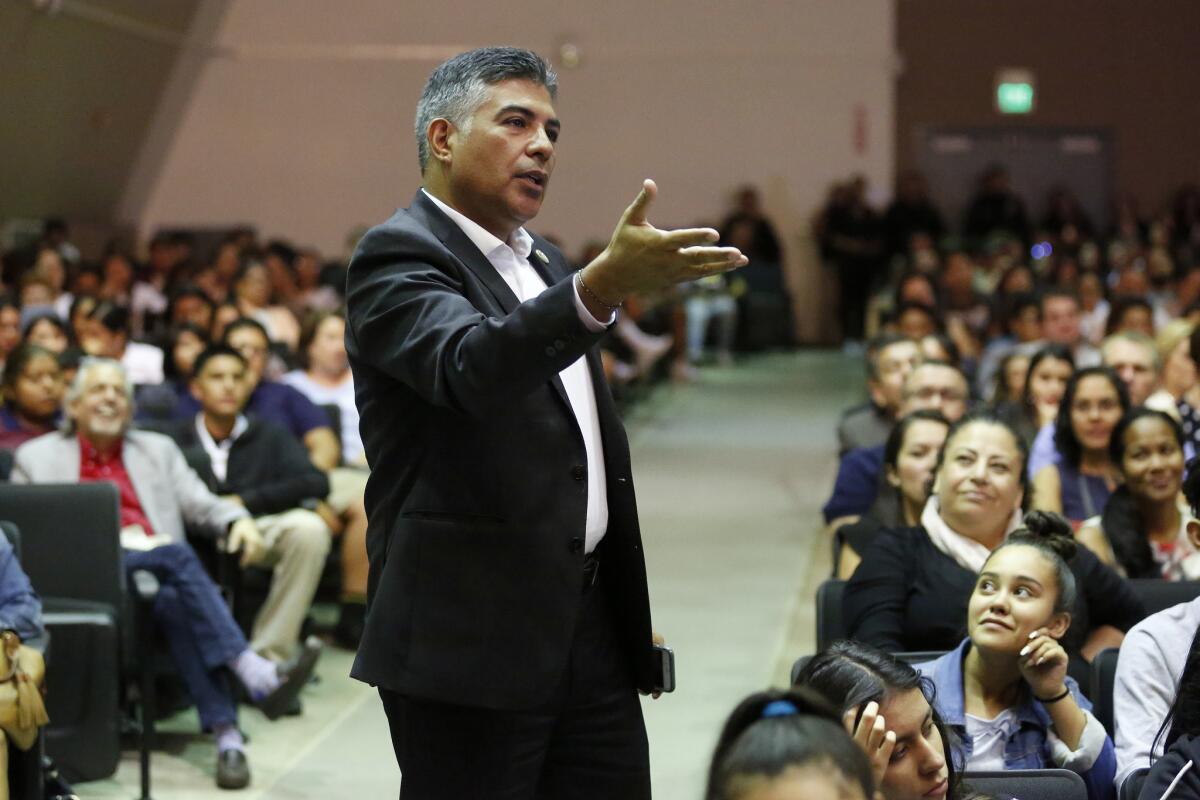
“Hamilton” fever has caught at least two Los Angeles area members of Congress who’ve used campaign funds to purchase tickets to the hit musical’s run at the Hollywood Pantages.
Rep. Tony Cárdenas’ campaign and his political action committee Victory by Investing, Building and Empowering PAC spent $105,500 in April buying tickets to the show, which is playing in L.A. until Dec. 30.
Two fundraisers using the approximately 400 tickets have raised more than $300,000, a spokesman for the congressman’s campaign said. For both Cárdenas’ campaign and the PAC, the tickets were the single most costly expense of the year.
“Basically they saw this as an opportunity to have a nice fundraising opportunity and go to a show that celebrates American democracy,” campaign spokesman Josh Pulliam said.
The Los Angeles Democrat is friends with the father of Lin-Manuel Miranda, the Tony- and Pulitzer-winning creator of “Hamilton.” When the show opened in Los Angeles in mid-August, Miranda spoke to nearly 1,000 students in Cárdenas’ largely Latino San Fernando Valley district. He raffled off some tickets to the show as an online fundraiser in September.
Miranda has a history of supporting Democrats, and “Hamilton” has been used as a fundraiser before. In July 2016, Hillary Clinton’s presidential campaign hosted a special showing of the musical for donors, with a starting ticket price of $2,700.
Cárdenas held two fundraisers tied to the show. Miranda did not attend either event, Pulliam said.
Pulliam said a few dozen tickets went to people in the community as gifts. He also raffled off some tickets to the show as an online fundraiser in September.
Cárdenas isn’t in a particularly tough race for 2018. A Democrat and a Green Party member have filed to run in his district, but neither have raised or spent enough to require them to file campaign finance reports.
Cárdenas’ most recent report, which covers what he raised and spent in the last three months, shows he raised $232,389 and had $481,049 in the bank as of Sept. 30.
It’s fairly common for lawmakers or candidates to use sports events or concerts as major fundraising opportunities, especially when big names such as Taylor Swift or Bruce Springsteen play concerts in Washington.
Rep. Maxine Waters’ campaign spent just under $11,000 on tickets to “Hamilton” in August.
Reached by phone, the Los Angeles Democrat seemed surprised reporters were asking about the tickets. She said her campaign made $110,000 at a fundraiser using the tickets.
“Everybody does it, whether it’s a concert or a baseball game,” she said.
Several conservative groups have targeted Waters, an outspoken critic of President Trump, for the 2018 election. She won in 2016 with 76% of the vote over Republican Omar Navarro, who is challenging her again.
In a statement released by her campaign, Waters stressed that fundraising at an event means the campaign doesn’t have to rent space or buy food.
“These fundraising activities are similar and sometimes less expensive than the amount of money a candidate would spend to host a fundraising dinner within a private room at a restaurant or hotel — once you factor in associated catering costs,” she said. “The price for the ‘Hamilton’ tickets was similar to what one would have to pay at these venues. There was nothing improper or unusual about the expenditure.”
- Share via
California Republicans increase security at state convention ahead of Steve Bannon speech
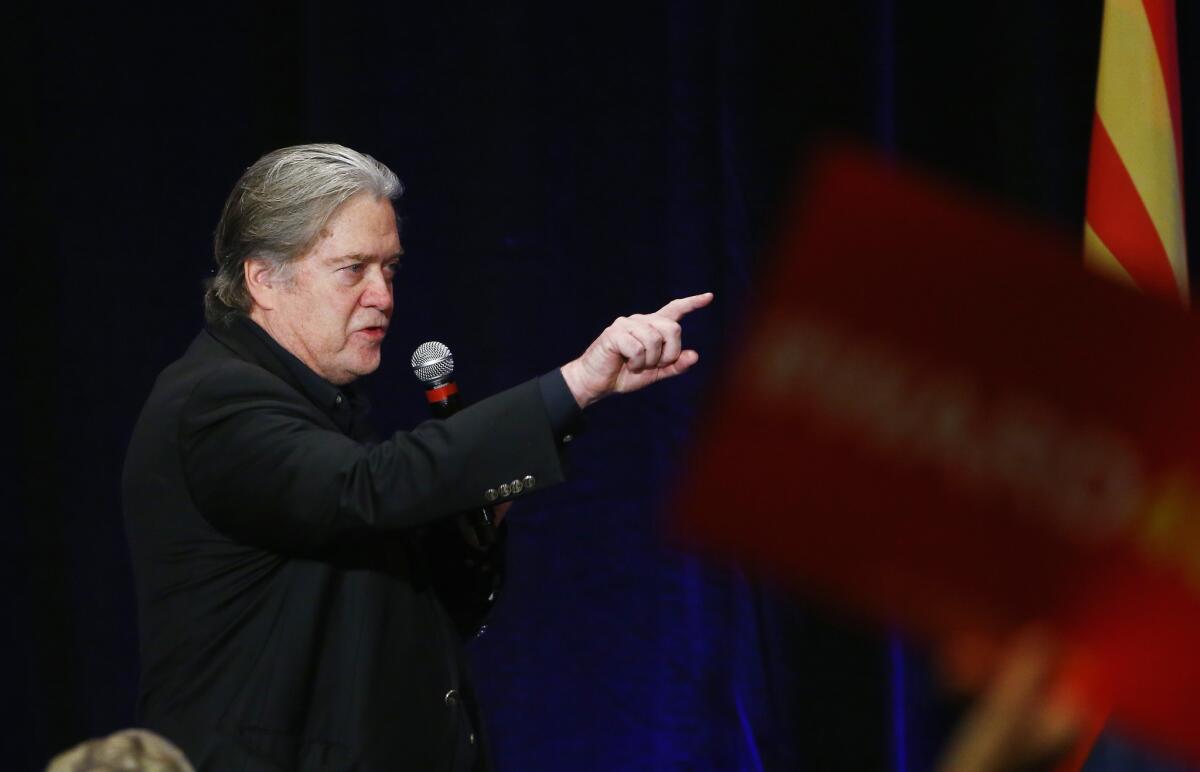
The California Republican Party is ramping up security at its weekend convention in anticipation of protests at the Friday night keynote speech by Steve Bannon, a former advisor to President Trump and the executive chairman of Breitbart News.
“Part of providing a good experience for our convention goers is assuring your safety,” state party Executive Director Cynthia Bryant wrote in an email to attendees on Thursday describing the security measures.
Attendees will pass through metal detectors and their property is subject to be searched before they are allowed to enter the ballroom at the Anaheim Marriott, where the speech and dinner are taking place. Weapons, noisemakers and signs are prohibited.
“We did not make the decision for the additional security lightly and we know that it does impact your convention going experience,” Bryant wrote. “I sincerely regret that.”
It’s a level of security rarely seen at political party gatherings in California. Convention attendees were also screened when Donald Trump, then a candidate seeking the GOP presidential nomination, appeared at the spring 2015 convention in Burlingame. That decision was made in consultation with the Secret Service, which had already begun protecting Trump.
That convention attracted large-scale protests that at times turned into tense stand-offs between activists and police officers. Bannon’s speech is also expected to draw protests.
Bannon, a conservative media leader, promoted Breitbart as a “platform of the alt-right” and needled establishment Republicans when Trump selected him to be the chief executive of his 2016 presidential campaign. His views as a nationalist, economic populist and nativist indelibly shaped Trump’s message to voters.
Once Trump was sworn in as president, Bannon was named White House chief strategist. He was a divisive figure in the administration, disparaging his colleagues to the media before he left the White House in August. He has since declared war on the GOP establishment, including supporting challengers to incumbents and other candidates backed by Trump.
- Share via
L.A. County Supervisors unanimously back Sen. Feinstein for reelection
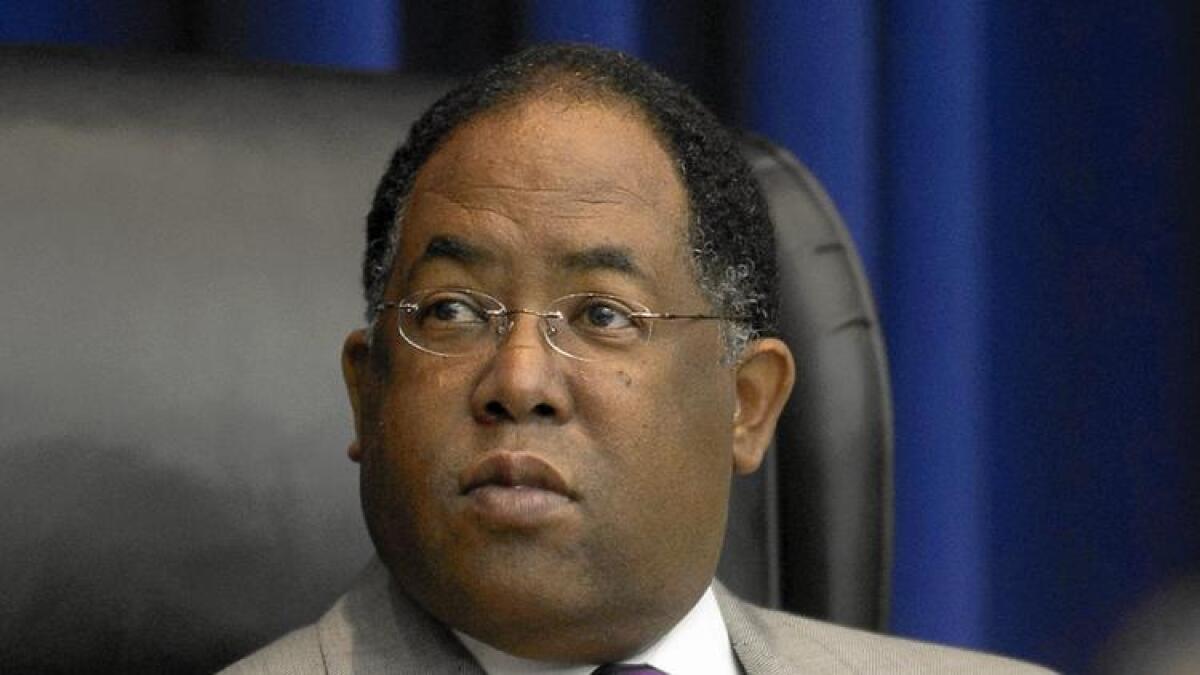
The five members of the Los Angeles County Board of Supervisors have all endorsed Sen. Dianne Feinstein, the senator’s campaign announced Thursday.
The announcement comes as factions of California Democrats begin weighing in on the Senate race between Feinstein and state Senate leader Kevin de León next year.
It’s a snub for De León, a native Angeleno who has represented part of the city for more than a decade in the Assembly and state Senate.
“Sen. Feinstein has been our strong partner on the critical issues confronting L.A. County … homelessness, healthcare, and transportation. Her support for our county hospitals, including her commitment to our new Martin Luther King Jr. Community Hospital, has been essential to our county’s healthcare system,” Board Chairman and 2nd District Supervisor Mark Ridley-Thomas said in a statement.
Ridley-Thomas said the board members support Feinstein -- including the lone Republican on the board, 5th District Supervisor Kathryn Barger, who said in a statement that California needs Feinstein in the Senate.
“I’ve worked with Sen. Feinstein for many years. She’s extremely knowledgeable and always prepared on the tough issues we confront. She’s a problem solver we can count on now and in the future,” Barger said.
Feinstein already has the backing of the Democratic Senatorial Campaign Committee, which traditionally backs incumbents. Soon after he announced a challenge, De León was endorsed by Democracy for America, the progressive political action committee formed by former Vermont Gov. Howard Dean in 2004.
- Share via
Northern California wildfires mean thousands of families will flood the region’s already strained housing market
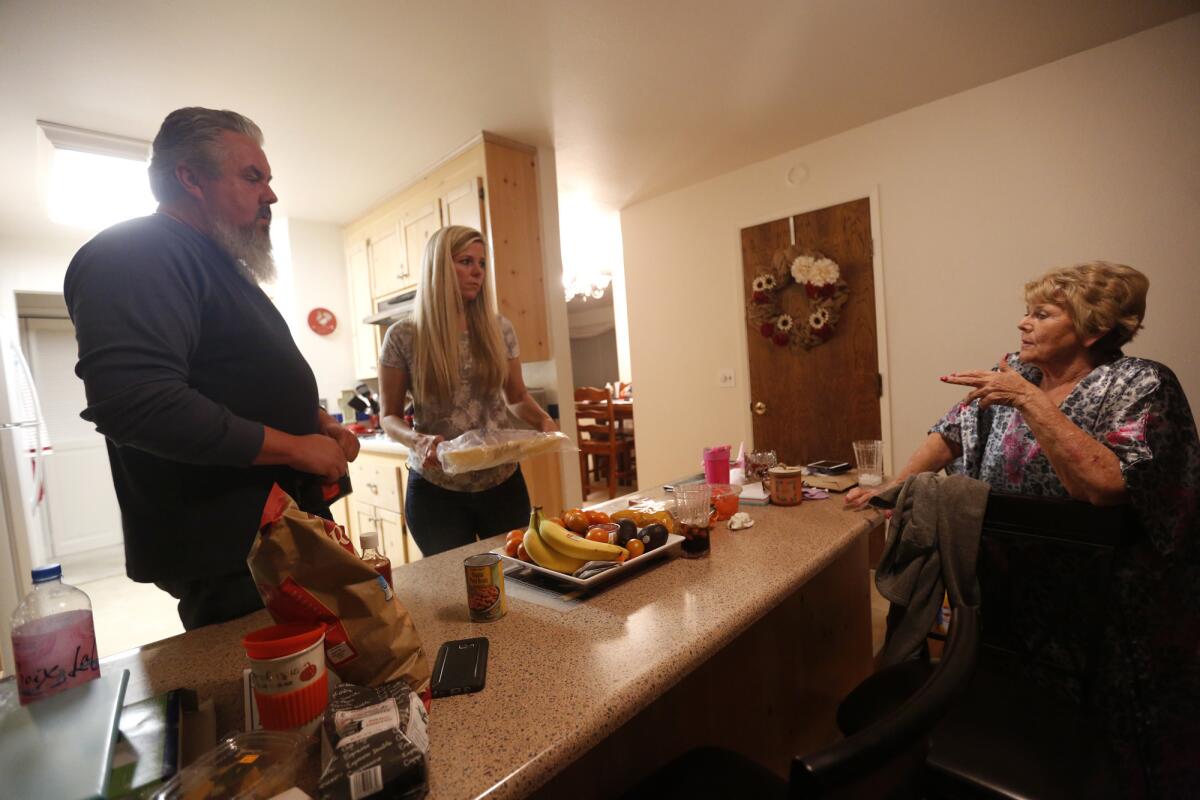
Even before devastating wildfires struck Northern California last week, the region’s housing market was in crisis.
Home values and rents already were at or near record highs, and decades of slow construction has left few homes available for the thousands of displaced residents.
The number of new families flooding the market is giving rise to fears of widespread displacement and even higher costs.
“The scope and magnitude of the rehousing is unfathomable,” said Larry Florin, chief executive of the nonprofit Burbank Housing, one of Santa Rosa’s largest low-income housing providers. “If you take 3,000 units being demolished in a market that was already dramatically constrained, it’s hard to imagine what’s going to happen, where people are going to go.”
- Share via
California lawmaker wants to ban secret settlements in sexual harassment cases after Weinstein scandal
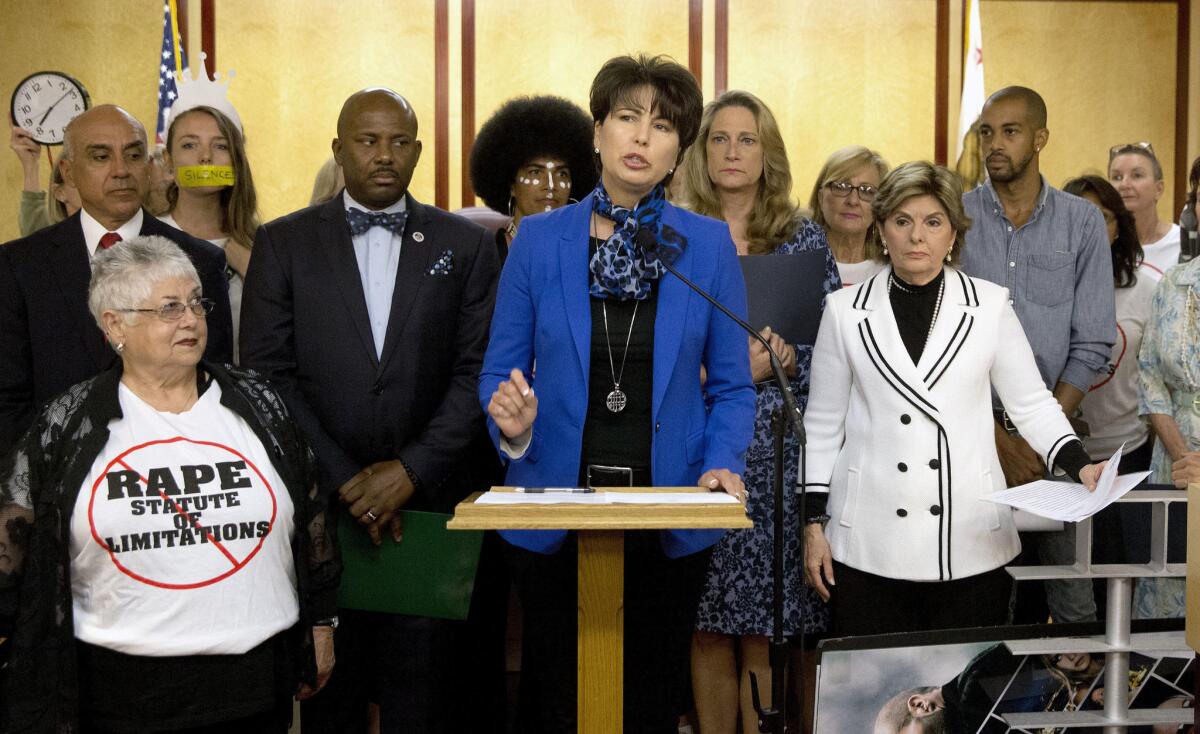
A California state senator says she intends to introduce a bill next year to ban confidentiality provisions in monetary settlements stemming from sexual harassment, assault and discrimination cases.
“Secret settlements in sexual assault and related cases can jeopardize the public — including other potential victims — and allow perpetrators to escape justice just because they have the money to pay the cost of the settlements,” Sen. Connie Leyva (D-Chino) said in a statement Thursday. “This bill will ensure that sexual predators can be held accountable for their actions and ideally prevent them from victimizing others.”
The measure comes after revelations of decades-long alleged sexual misconduct by Hollywood producer Harvey Weinstein. Some of those incidents were obscured from public view thanks to monetary settlements whose terms required confidentiality.
The issue has a renewed resonance in Sacramento after scores of women working in state politics renounced a “pervasive” culture of harassment and abuse in the Capitol in a public letter this week.
Leyva told the Times she intends for her proposed settlement ban to include both private employers and public ones, such as the Legislature.
9:41 a.m.: This post was updated to specify Leyva’s proposal would apply to private and public employers.
This post was originally published at 8:54 a.m.
- Share via
Nancy Pelosi: ‘It’s your problem if you don’t recognize that women are ready to do any job’
Nancy Pelosi knows what it feels like to have to prove herself in politics simply because she’s a woman. She says she experiences the pressure every day.
But “it’s your problem if you don’t recognize that women are ready to do any job,” the House minority leader said in an interview before a Summit event hosted by the Los Angeles Times and the Berggruen Institute on Wednesday night.
When she decided to run for a leadership position in Congress, Pelosi said a man questioned her move.
“As if a woman had to be told she could run,” she recalled. “We just laughed and said ‘poor babies.’”
In the midst of a growing sexual misconduct scandal centered on Hollywood film producer Harvey Weinstein, many women are sharing their stories of sexual harassment and assault. No industry has been spared — women at California’s Capitol signed an open letter Tuesday outlining “pervasive” harassment in Sacramento.
Pelosi said she wasn’t prepared to share a so-called “me too” moment, but she thanked the women who have.
“The sheer numbers speak eloquently to the fact that we should get to zero tolerance,” she said.
- Share via
Watch: The View from California political panel with John Myers
Sacramento Bureau Chief John Myers hosted a panel discussion about the view from California as part of our L.A. Times and Berggruen Institute Summit series.
Joining him were state Sen. Robert Hertzberg (D-Van Nuys), Republican strategist Luis Alvarado, UCLA political scientist Lynn Vavreck and Alma Hernandez, executive director of SEIU California.
We also had a conversation with House Minority Leader Nancy Pelosi. Watch that here.
- Share via
Watch: House Minority Leader Nancy Pelosi talks to the L.A. Times
House Minority Leader Nancy Pelosi (D-San Francisco) spoke Wednesday about her view of national news, working with the Trump White House and the future of the Democratic Party. The event was co-hosted by The L.A. Times and the Berggruen Institute.
Following that conversation, Sacramento Bureau Chief John Myers hosted a panel discussion about the view from California. Joining him were state Sen. Robert Hertzberg (D-Van Nuys), Republican strategist Luis Alvarado, UCLA political scientist Lynn Vavreck and Alma Hernandez, executive director of SEIU California. Watch that here.
- Share via
Kevin de León: ‘My whole life, I’ve been told to wait my turn and know my place’
You know, my whole life, I’ve been told to wait my turn and know my place. Well, it’s California’s turn to lead. And California’s place to be a shining example for the world and a stark contrast to the failures of Washington.
— State Senate leader Kevin de León, kicking off his U.S. Senate campaign
- Share via
Pelosi, in Los Angeles visit, calls on Congress to pass Dream Act
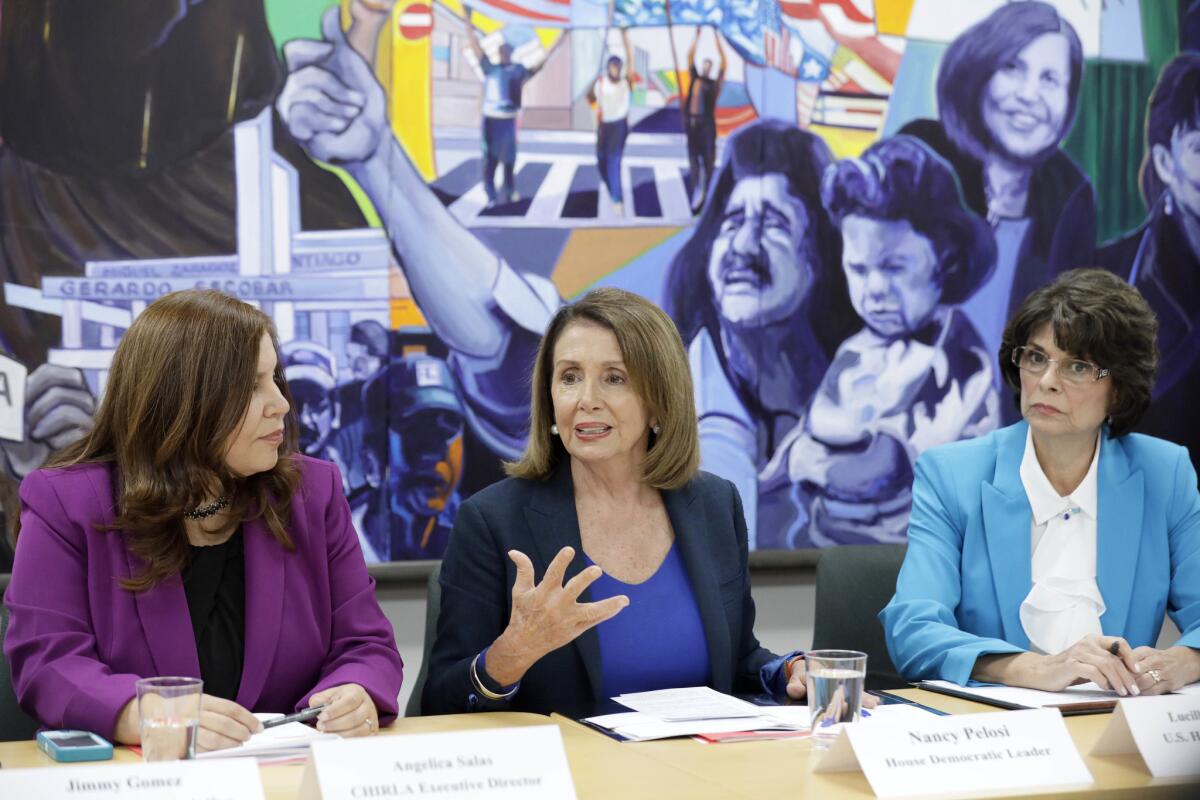
House Minority Leader Nancy Pelosi on Wednesday called on the GOP-controlled Congress to pass the Dream Act by year’s end.
Pelosi appeared at the Coalition for Humane Immigrant Rights with community leaders and Deferred Action for Childhood Arrival recipients in Los Angeles.
The San Francisco Democrat said she has confidence Republicans and Democrats will be able to work together to pass the Dream Act.
President Trump “said we had shared values when we spoke to him,” Pelosi said. “I trust that he will honor that commitment because the American people want him to do so.”
The Democratic leader had conversations with Trump about continuing DACA after his “heartless” decision to end the program.
Pelosi said that President Reagan was “great on immigration” and noted his immigration agenda protected a larger percentage of people than President Obama did with his executive order regarding DACA. She added the last three Republican presidents “strongly acknowledged the value of immigration to America.”
A majority of the estimated 800,000 immigrants who were brought to the United States illegally as children live in California.
“These newcomers make America more American,” Pelosi said.
She noted there have been a handful of Republicans who support forcing a Dream Act vote via a procedural move. Still, her party is in the minority. “You can have all the conversation in the world that you want, but you’ve got to have the votes,” she said, encouraging moderate Republicans to support the Dream Act.
She was joined by Democratic Reps. Jimmy Gomez of Los Angeles, Judy Chu of Monterey Park and Lucille Roybal-Allard of Downey, the first Mexican American woman elected to Congress and original co-author of the Dream Act.
Roybal-Allard said the so-called Dreamers “have lived in this country, they have grown up here, they have pledged allegiance to our flag.”
“To do anything else but to protect them by passing the Dream Act is a betrayal and would be a disgrace and a very ugly mark on this country,” she said.
Jiho Yu, a DACA recipient who moved from South Korea to Los Angeles at age 5, and a second-year student at Los Angeles City College, said she was hopeful about her status in the future. “I know that our congressmen and -women, they’re fighting very hard for us,” she said.
Pelosi is in Los Angeles for an event hosted Wednesday night by The Times.
Watch this space for the livestream, which begins at 7 p.m.
4:20 p.m.: This post was updated to clarify Pelosi’s comments about Reagan’s immigration agenda and that she was not referencing the midterm elections when talking about the need for votes.
- Share via
Kevin de León kicks off his campaign for U.S. Senate in Los Angeles

- Share via
California and other states seek emergency order to stop Trump administration from cutting off healthcare subsidies

California Atty. Gen. Xavier Becerra asked a federal court Wednesday to issue an emergency temporary restraining order to block the Trump administration from cutting off cost-sharing subsidies that help reduce the price of healthcare for millions of Americans.
A week after California and 17 other states filed a lawsuit challenging the decision on its merits, the same attorneys general requested a restraining order to avoid immediate harm to millions of people who get subsidized healthcare through the Affordable Care Act, Becerra said.
“The actions of the president of the United States to deny people affordable healthcare insurance, or make it so they will pay more money out of pocket for that health insurance, is not only irresponsible but it is illegal,” Becerra said at a news conference.
Trump has said on Twitter that he was stopping “massive subsidy payments” to Democrats’ “pet insurance companies,” and called on Congress to negotiate a fix.
The latest court filing argues the federal government payments are required by law and the decision to stop making the payments violates administrative procedures.
The request for a restraining order says the states “have shown that immediate and irreparable injury” is threatened to “millions of Americans who have access to affordable healthcare coverage under the Patient Protection and Affordable Care Act if defendants stop making timely and complete cost-sharing reduction payments.”
- Share via
John Cox, Republican candidate for governor, pledges ‘six figures’ support for initiative to repeal gas tax hike
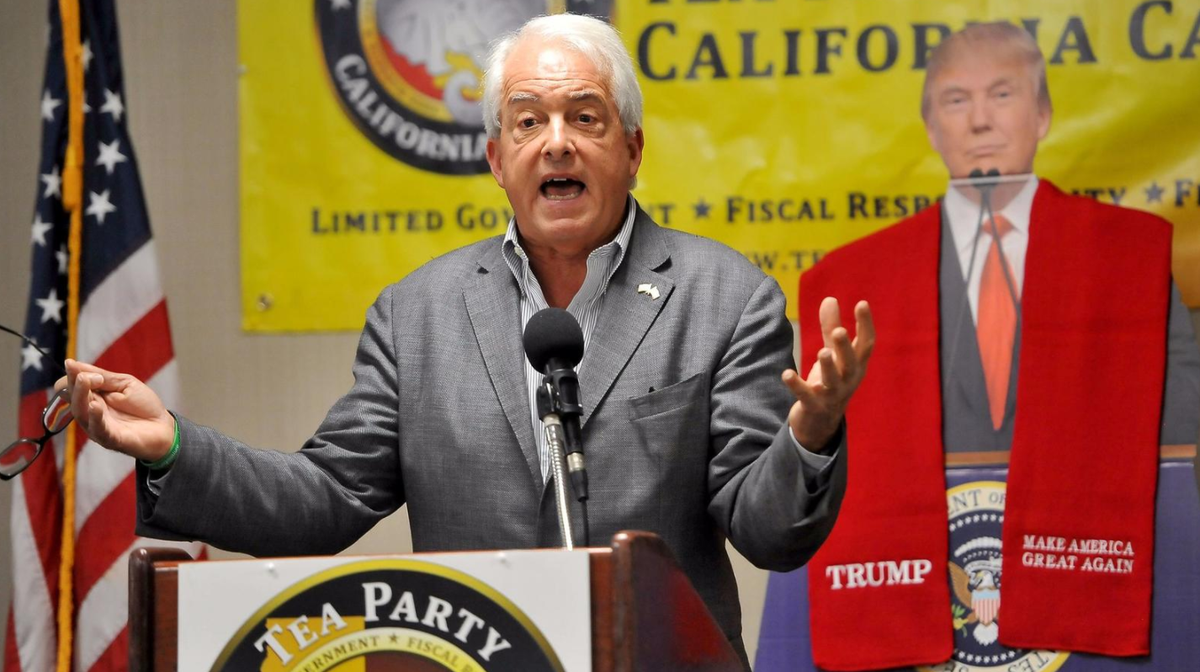
Republican gubernatorial candidate John Cox said Wednesday he will donate a “substantial” amount of money — in the “six figures” — to a campaign to qualify a ballot measure that would repeal increases in gas taxes and vehicle fees in California.
Cox, a wealthy businessman, was named Wednesday as honorary co-chairman for the campaign, which needs to collect 584,000 signatures to qualify a constitutional amendment for the November 2018 ballot that would repeal the tax increases and require action by voters to raise taxes in the future.
“In my travels across the state, I am finding working Californians who are questioning whether they can even stay in a state that the politicians are making even more unaffordable, even as we speak,” Cox said at a news conference at California Republican Party headquarters in Sacramento. “You also can’t keep making it unaffordable for businesses to be in this state.”
Cox’s announcement means there are two Republican candidates for governor backing separate initiatives to repeal the gas tax. Assemblyman Travis Allen (R-Huntington Beach) is launching a different initiative — which is not a constitutional amendment — that would invalidate the gas tax and vehicle fee increases approved by the Legislature in April.
Both ballot measures are opposed by the Fix Our Roads coalition, which includes business and civic groups. The coalition is open to talks on alternatives to ballot measures, said spokeswoman Kathy Fairbanks.
“We will campaign against it if it should get on the ballot,” Fairbanks said. “Voters are fed up with the traffic, with the bad roads and they want to move forward and fix our roads.”
- Share via
Republican Justin Fareed hasn’t announced he’s running for Congress again, but fundraising numbers suggest he will
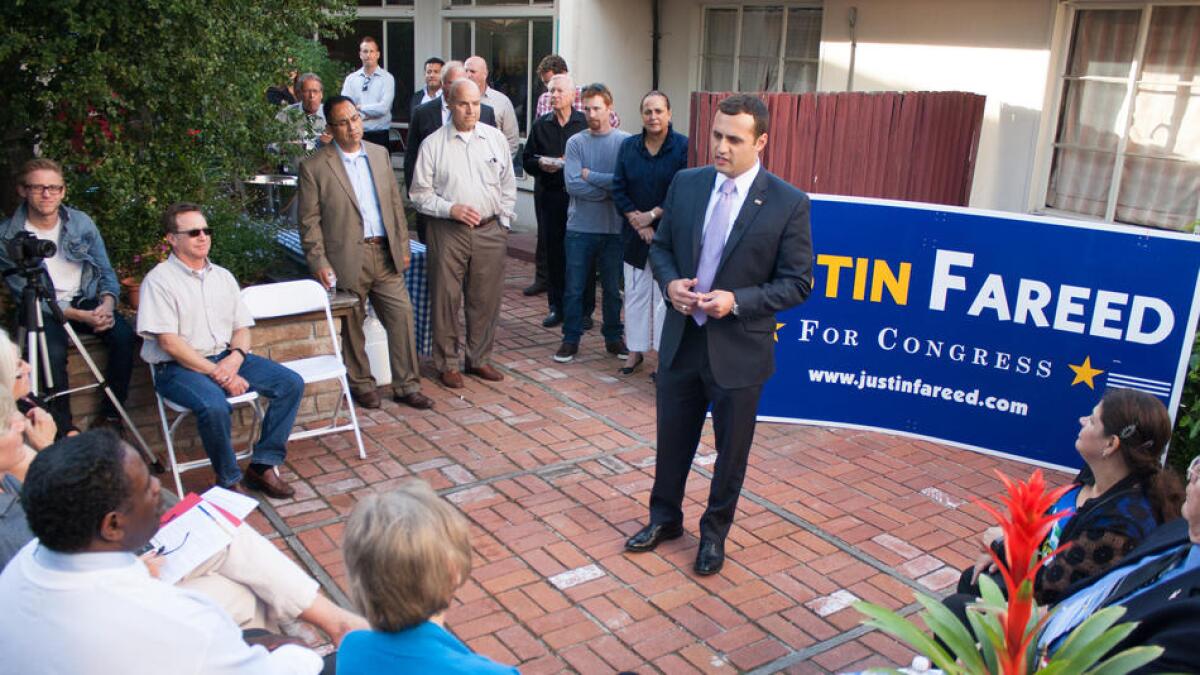
Republican Justin Fareed has tried to be coy about whether he’ll make a third run for Congress against Rep. Salud Carbajal (D-Santa Barbara).
He filed in August for the 2018 election cycle but hasn’t made any announcements on social media or elsewhere about his plans. He told a local TV news station that he’s “been encouraged by friends, family and countless voters” to throw his hat in the ring again. An email to supporters this week said he’s still “exploring” whether to run.
But his campaign fundraising tells a different story.
Fareed, 29, reported raising $215,565 between July 1 and Sept. 30, and he had $258,528 in cash on hand as of that date. That’s after he reported receiving no campaign contributions in the first six months of the year.
Another Republican, civil engineer Michael Erin Woody, has said he’s challenging Carbajal. He reported raising a total of $11,200 as of Sept. 30, nearly half of it in the form of a loan to himself.
Last year, Fareed lost to Carbajal by nearly 7 percentage points in a race to fill the open seat of Lois Capps, who was retiring. It was one of the most expensive races in the state.
A campaign spokesman for Fareed did not return calls for comment.
- Share via
Conservative activists want to overturn California’s ‘sanctuary state’ law through a 2018 ballot measure
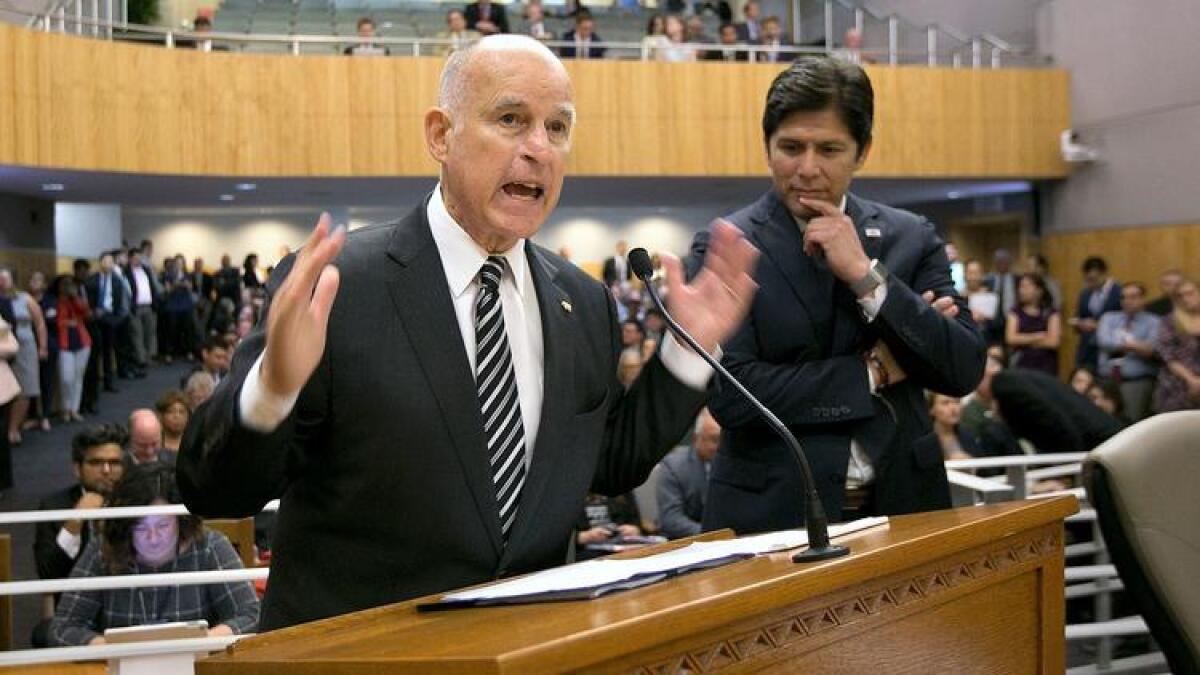
Marco Gutierrez, the founder of Latinos for Trump, gained overnight notoriety during the 2016 presidential campaign when he warned against the spread of his culture.
“If you don’t do something about it, you’re going to have taco trucks on every corner,” he said on national television.
On Tuesday, Gutierrez and a handful of conservative activists from Fresno filed a referendum to allow voters to block the implementation of California’s landmark “sanctuary state” law. Supporters would have to collect 365,880 voter signatures by early January to qualify the measure. The law would then be on hold pending the results of the November statewide election, when voters would be asked whether to keep or reject the law.
The law, signed earlier this month by Gov. Jerry Brown, will limit law enforcement agencies from questioning and detaining people for immigration violations. It was the centerpiece of an effort by legislative Democrats to seek new protections for some 2.3 million people living illegally in California from the Trump administration’s call for more deportations.
Ben Bergquam, a Trump supporter and small business owner who identified himself on Tuesday as a spokesman for the small group pushing the referendum, said the effort is led by five citizens in California and a few others across the state.
“It is a lawless law by politicians,” he said.
- Share via
A Darrell Issa challenger has raised nearly $1 million this year, and it’s not the one who almost beat him
Rep. Darrell Issa (R-Vista) is on the defensive this year, with three Democrats already jumping in to challenge him fresh off a narrow 1,621-vote victory in 2016.
One of them, environmental attorney Mike Levin, has raised more than $918,000 since the beginning of the year, the most of any challenger facing Issa. Nearly all of that money has come from individual donations, campaign finance records show, and Levin posted the biggest fundraising numbers of any California challenger last quarter.
Another challenger, real estate investor Paul Kerr, outraised Issa during the third quarter of 2017, pulling in $504,327 in his first campaign finance report thanks to more than $262,000 of his own money.
And Doug Applegate, the retired Marine colonel who nearly bested Issa last year, has raised $734,704.
All three challengers still have much less money in the bank than Issa, who has raised more than $1.6 million this year and reported $852,028 in cash on hand as of Sept. 30.
Levin reported having $530,326 in the bank, while Kerr had $229,040 and Applegate had $263,160.
Issa is considered one of the most vulnerable GOP members in California but is also one of the wealthiest.
- Share via
California Assembly leader on harassment in the Capitol: ‘Clearly we need to do more’
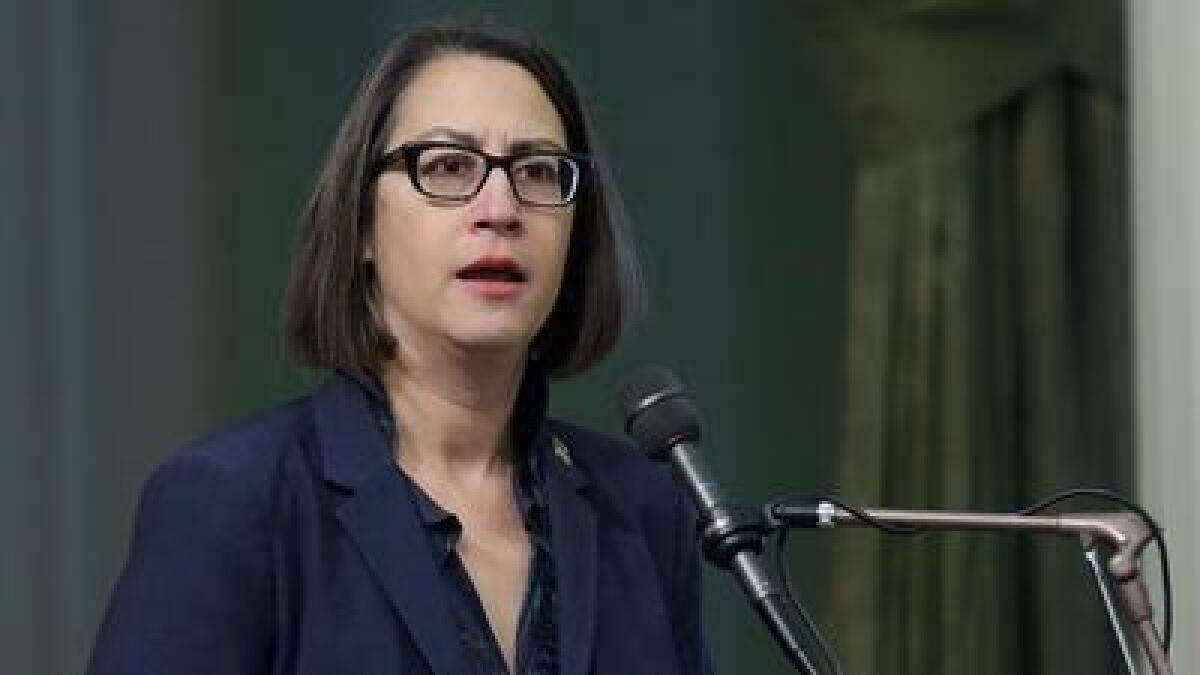
A blunt open letter on a culture of sexual harassment and mistreatment in the Capitol has prompted Democratic leaders to pledge to review the Legislature’s policies on handling abuse complaints.
Assembly Speaker Anthony Rendon (D-Paramount) said the scandal over Harvey Weinstein’s treatment of women has prompted introspection in the California statehouse.
“When women stand up to point out those abuses, I applaud their bravery and I cringe for their pain. My discomfort is for what they have gone through, not for how it reflects on the institution I represent,” he wrote in a Huffington Post blog post Tuesday afternoon.
Rendon said a special panel on harassment — which was created in June to examine the Assembly’s reporting protocols — will examine the issue. The panel is chaired by Assemblywoman Laura Friedman (D-Glendale), one of six sitting legislators to sign the original letter.
Senate leader Kevin de León (D-Los Angeles) said Monday night, prior to the letter’s publication, that the Senate also can do more to protect its workers.
“The Senate is reviewing its procedures and policies to ensure we are doing all we can to promote a safe workplace and culture of respect, to encourage and protect victims who come forward and to demand accountability from those who violate these policies,” De León said in a statement.
The letter was published Tuesday morning with more than 140 signatories. More than 200 women have now signed the letter.
Other California elected officials chimed in on Twitter with their support.
5:05 p.m.: This post incorrectly stated the special subcommittee on harassment was established in August. It was created in June.
This post was originally published at 4:53 p.m.
- Share via
California’s GOP members got a big boost from group that held fundraiser with Vice President Pence

California Republican House members have received more than $1 million from a committee that recently benefited from a fundraiser with Vice President Pence.
California Victory 2018 -- a joint fundraising committee that helps political action committees belonging to Pence and Rep. Kevin McCarthy as well as congressional campaign accounts of McCarthy and seven California Republicans -- received proceeds from a string of Pence fundraisers across the state last week.
The fundraisers were originally scheduled for the week of Sept. 14 but were canceled at the last minute due to hurricane recovery efforts.
McCarthy’s campaign account received the biggest chunk of money, about $392,700 from California Victory 2018. The other seven members who got money were Reps. Jeff Denham of Turlock, David Valadao of Hanford, Steve Knight of Palmdale, Darrell Issa of Vista, Dana Rohrabacher of Costa Mesa, and Mimi Walters of Irvine, whose campaign accounts received $70,000 to $97,000 each.
All seven are considered some of the most vulnerable California Republican members in next year’s midterm elections.
Democrats who have been deemed vulnerable by the National Republican Congressional Committee didn’t get nearly as much help from joint fundraising committees. Rep. Salud Carbajal (D-Santa Barbara) and Rep. Raul Ruiz (D-Palm Desert) each received $8,670 from the Bold Frontline Democrats PAC, which also benefits the Congressional Hispanic Caucus. Rep. Ami Bera (D-Elk Grove) took in $1,942 from the Bera Victory Fund.
- Share via
Join us in person or online for our event with Nancy Pelosi and state political leaders Wednesday
Wednesday night I’ll sit down with House Minority Leader Nancy Pelosi (D-Calif.) to get her view of national news, working with the Trump White House and the future of the Democratic Party.
Following our conversation, Sacramento Bureau Chief John Myers will host a panel discussion about the view from California. Joining him will be state Sen. Robert Hertzberg (D-Van Nuys), Republican strategist Luis Alvarado, UCLA political scientist Lynn Vavreck and Alma Hernandez, executive director of SEIU California
We’ll livestream the event here starting at 7 p.m.
This post has been updated because the event is sold out.
- Share via
Sen. Dianne Feinstein had $4 million in the bank just before she announced another run
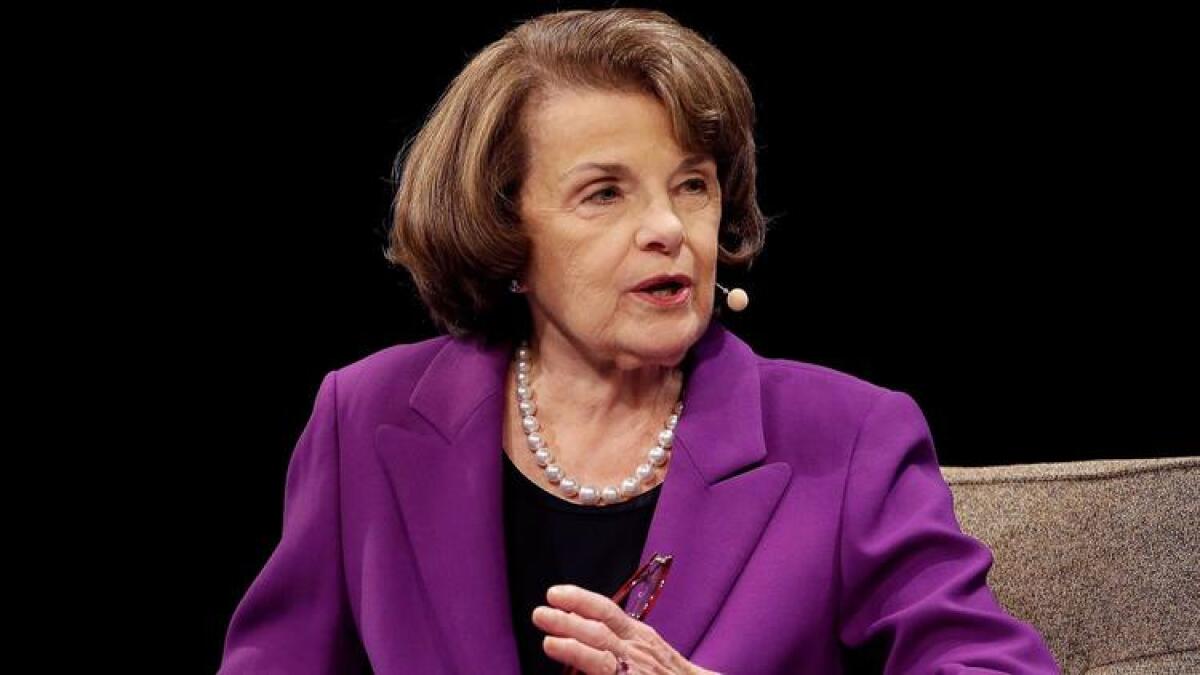
Sen. Dianne Feinstein had nearly $4 million in the bank with just over a year to go before the 2018 election.
Campaign finance reports also show she raised just over half a million dollars in the last three months as speculation swirled about whether she would run for reelection and whether a formidable Democrat might challenge her in the June primary. The contributions overwhelmingly came from individual donors, rather than political action committees or other campaigns.
Feinstein announced last week that she would run for a sixth time, just ahead of an announcement over the weekend that state Senate leader Kevin de León would seek the seat. At least one other prominent Democrat — billionaire environmentalist Tom Steyer — also is considering a bid.
Feinstein is a prodigious fundraiser. In her last three campaigns, she raised between $8 million and $13 million, and she has the wealth to personally fund a campaign if necessary.
Feinstein’s campaign raised an additional $400,000 in the week since her announcement, Feinstein strategist Bill Carrick said. Some of the new cash likely came from a Los Angeles fundraiser she attended on Oct. 10.
- Share via
Read the letter: Women in California politics call out ‘pervasive’ culture of sexual harassment
A state legislator who was groped by a male lobbyist weeks after she was sworn into office. A legislative staffer-turned-lobbyist who for years would only wear pantsuits in order to project a “business-only” air. A government affairs director who faced inappropriate advances from an associate in full view of male colleagues, who seemed oblivious as it happened.
As Hollywood takes a hard look at itself in the wake of the spiraling Harvey Weinstein sexual misconduct scandal, the women of California politics are publicly declaring: Us too.
More than 140 women — including legislators, Capitol staff, political consultants and lobbyists — are signing onto a letter calling out the “pervasive” culture of sexual harassment and mistreatment that plagues their industry.
The signatories include six of 26 women in the Legislature, two retired lawmakers, a Board of Equalization member and officials from the state Democratic and Republican parties.
- Share via
California Politics Podcast: The battle between Feinstein and De León
California voters will face a big choice, and an unusual one, in next year’s race for the U.S. Senate: A long-time incumbent Democrat challenged by a prominent politician from her own party.
The decision by state Senate President Pro Tem Kevin de León (D-Los Angeles) to challenge Sen. Dianne Feinstein in 2018 is already dividing Democrats on issues ranging from seniority and pragmatism to battling President Trump and promoting issues favored by the party’s liberal base.
On this special episode of the California Politics Podcast, we take a closer look at the early dynamics of the race. We also assess the chances of additional prominent candidates from both major parties jumping in the contest, as well as the keys to success for Feinstein and De León.
I’m joined by Times staff writer Melanie Mason and Marisa Lagos of KQED.
- Share via
Feinstein supporters launch super PAC to support her in reelection battle with fellow Democrat
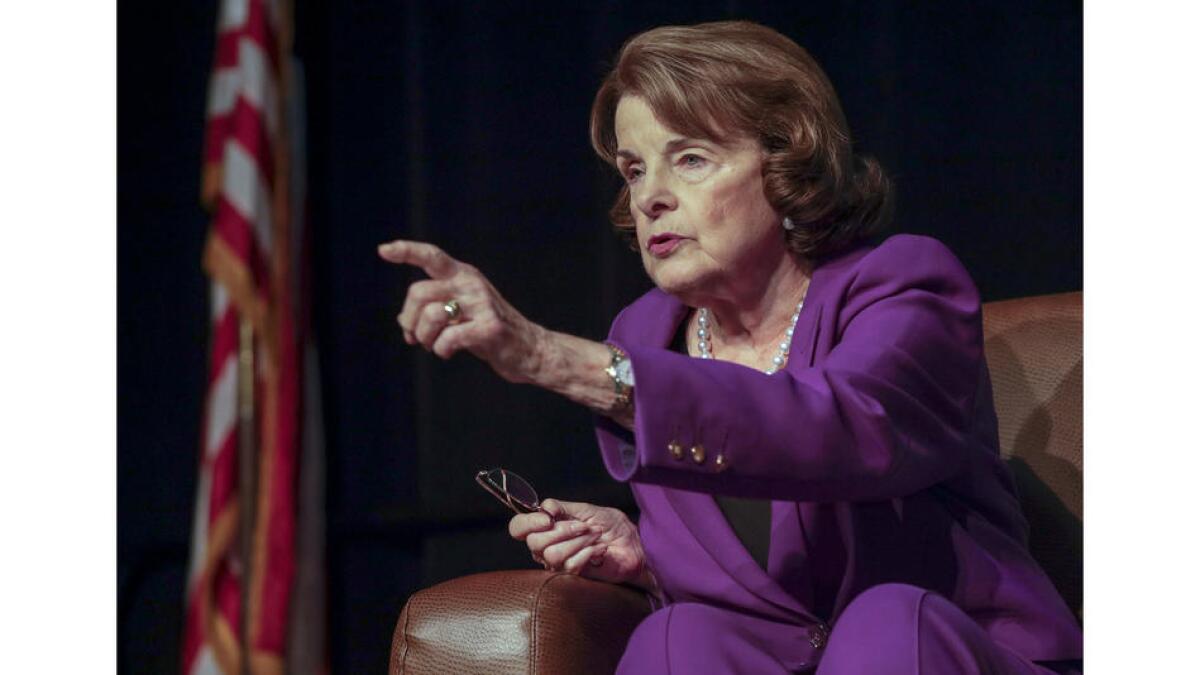
A prominent Democratic campaign firm announced Monday that it is launching a super PAC to back California Sen. Dianne Feinstein after her reelection bid was challenged by a fellow Democrat.
“We see the highest-ranking woman in the U.S. Senate under attack by political opportunists, and we are determined to fight just as hard for her as she fights for California,” said Sean Clegg, a partner at SCN Strategies, which represents Gov. Jerry Brown, Sen. Kamala Harris, Lt. Gov. Gavin Newsom and others.
Donors can contribute unlimited amounts to a super PAC, which cannot coordinate with a candidate’s campaign.
The San Francisco group announced the formation of the “Fight for California” super PAC one day after Democratic state Senate leader Kevin de León announced he would challenge Feinstein, and on the same day a pro-De León super PAC was launched.
De León faces many hurdles in challenging Feinstein, a decades-long fixture in California politics. Among the most pressing is money.
De León lacks the donor base of other candidates who have run for statewide office. The nearly $3 million he has in state campaign accounts can’t be used in a federal race. He does enjoy support from donors because of his leadership role, but they may be reluctant to open their wallets and anger Feinstein.
- Share via
Half a dozen GOP House incumbents were out-raised by Democratic challengers in California
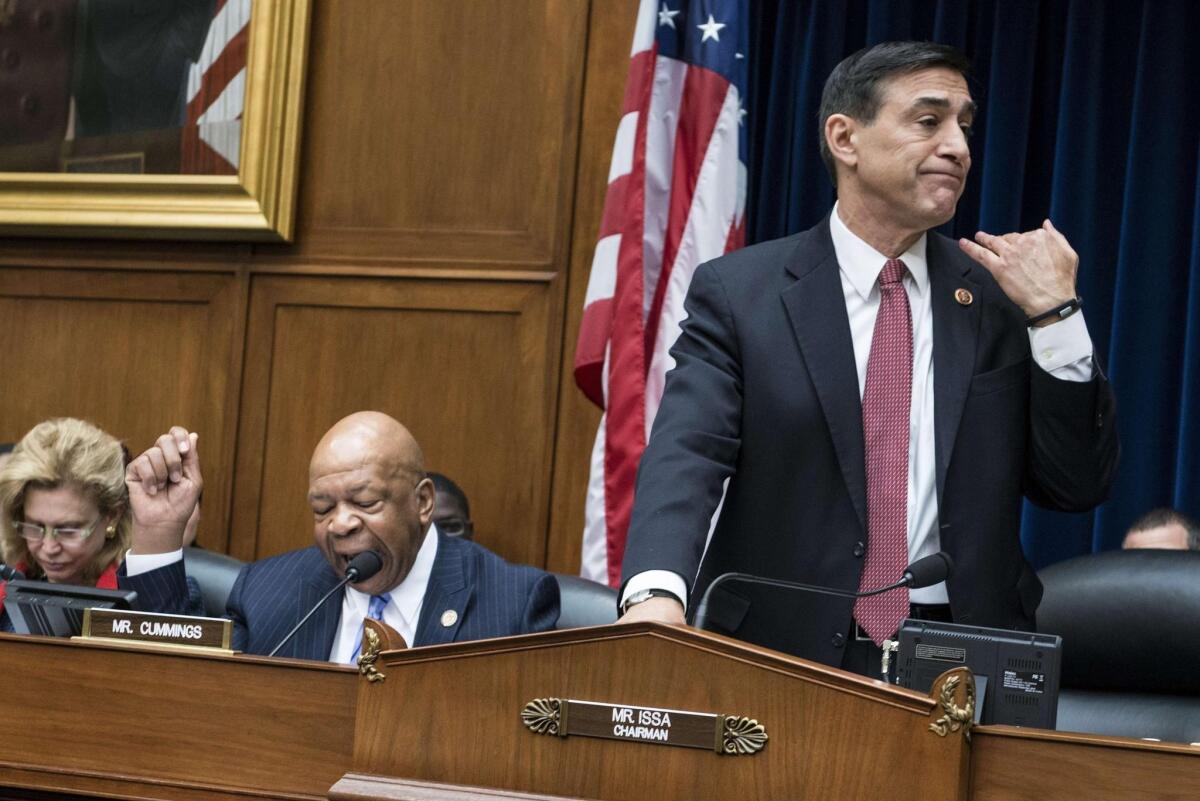
Half of California’s 14 Republican House members were out-raised by upstart Democratic challengers, the latest campaign finance filings show.
Six of the seven are considered vulnerable in next year’s midterm elections.
Rep. Ed Royce (R-Fullerton), who has several opponents who have put hundreds of thousands or more into their own campaigns, was the most behind. Royce raised a total of $705,069 from July 1 to Sep. 30. Democrat Andy Thorburn reported raising $2,142,477, of which about $2 million was a loan to his own campaign. Gil Cisneros, another Democratic challenger, reported raising $732,789, including a $550,000 loan to himself.
Discounting personal money, Republican Rep. Tom McClintock of Elk Grove had the biggest deficit. Democratic challenger Jessica Morse raised six figures more than him, with $268,271 in contributions.
Embattled Rep. Duncan Hunter of Alpine also posted anemic numbers compared with his challengers. Democrats Ammar Campa-Najjar and Josh Butner raised $170,304 and $175,146 respectively, nearly double the $91,446 Hunter reported raising at the end of the quarter.
Rep. Steve Knight of Palmdale was out-raised by a competitor and nearly overtaken by another. Reps. Darrell Issa (R-Vista) and Mimi Walters (R-Irvine) also had lower fundraising figures than competitors.
And although Rep. Dana Rohrabacher (R-Costa Mesa) reported raising more last quarter than his seven Democratic challengers, more than $75,000 of that was a partial restitution payment from a case in which his former campaign treasurer admitted to embezzling funds from the campaign. Without the restitution check, Rohrabacher’s third-quarter fundraising was actually just $272,606, less money than Democratic challengers Hans Keirstead, Omar Siddiqui, and Harley Rouda each took in.
The combined amounts Democrats running against Walters, Knight, Issa, Hunter and Rep. Dana Rohrabacher (R-Costa Mesa) have raised so far this year are higher than the incumbents they’re facing as well.
UPDATE:
5:01 p.m.: This post was updated to clarify that Rohrabacher was out-raised by opponents when discounting the restitution payment his campaign received.
- Share via
Rep. Dana Rohrabacher’s campaign gets paid back some of the money an ex-treasurer stole
One of the biggest checks written to Rep. Dana Rohrabacher’s campaign account last quarter wasn’t from an individual donor or a political action committee.
It was for $75,033.36 — a part of the restitution Rohrbacher’s campaign is owed by disgraced former campaign treasurer, Jack Wenppo Wu.
Wu pleaded guilty in January to embezzling more than $300,000 from Rohrabacher’s reelection committee. In April, he was sentenced to a year in county jail and five years of probation, and was ordered to pay $202,351.36 in restitution to Rohrabacher’s campaign.
He served as the committee’s volunteer campaign treasurer for about seven years, Rohrabacher’s attorney has previously said. The campaign discovered the funds were missing in 2015, when a campaign manager tried to use one of the committee’s debit cards and the transaction was denied.
Without the restitution check, Rohrabacher’s third quarter fundraising was actually just $272,606, less money than Democratic challengers Hans Keirstead, Omar Siddiqui, and Harley Rouda each took in.
- Share via
Sen. Kamala Harris raises $440,547 this quarter
Sen. Kamala Harris raised $440,547 in the last three months, bringing her war chest to $1.5 million with five years to go before she’s up for reelection.
Most of Harris’ contributions come from individual donors.
Unlike House members, who have to file reports electronically with the Federal Election Commission, senators file reports on paper with the Secretary of the Senate. The Senate then forwards those paper reports to the FEC, which pays a company to hand input them into a digital system. It’s a time-consuming process that can delay for weeks or months the release of public information about how much a candidate raises or spends.
Harris is among about 20 senators who voluntarily submit campaign finance reports directly to the Federal Election Commission so they can be made public more quickly.
Sen. Dianne Feinstein (D-Calif.) does her filing the old-fashioned way, so some time could pass before a detailed picture emerges of how much she raised and spent in the third quarter.
The last report showed Feinstein with $3.6 million in the bank, a fraction of what she will need ahead of the 2018 election, especially with the announcement over the weekend that state Sen. Kevin de León (D-Los Angeles) is challenging her and speculation swirling about who else will jump into the race.
- Share via
Former local news anchor will challenge Palm Desert Rep. Raul Ruiz
Rep. Raul Ruiz (D-Palm Desert) has picked up a second Republican challenger in his Riverside County district.
Republican Dan Ball, a former local news anchor, announced Monday that he’ll run in the 36th Congressional District against Ruiz.
Ball, 42, most recently worked at KMIR-TV in Palm Desert but left the station in February and is now working as a real estate agent. Born and raised in Ohio, Ball is an Air Force veteran and spent more than two decades as a TV reporter and anchor, including stints in Riverside County and Las Vegas. He has lived in Palm Desert for the last three years.
“It’s time this district had a strong community leader represent us in Washington who will put constituents first, work across the aisle and actually get things done for our community,” Ball said in a statement announcing his run.
He also faces fellow Republican Kimberlin Brown, an actress and businesswoman who announced last week.
Ruiz, who is considered one of the least vulnerable congressional Democrats being targeted next year, reported having more than $1.7 million in cash on hand as of Sep. 30. His opponents, who entered the race after the reporting deadline for the third quarter, have not reported raising any money.
- Share via
This California congressional candidate has lent himself $2 million to run against Rep. Ed Royce
Democrat Andy Thorburn’s campaign finance report stands out just a bit from other first-time candidates in California.
That’s because the health insurance executive lent himself $2 million to kick off his bid against Rep. Ed Royce (R-Fullerton) in Orange County’s 39th Congressional District.
Many first-time candidates might raise $100,000 in their first few months, if they are lucky. But a handful of aspiring California politicians have made some rather substantial contributions to kick-start their campaigns.
Thornburn’s loan was the largest, but six other Democratic candidates have also lent their campaigns more than $100,000. All of them are running for one of two districts in the traditional Republican stronghold of Orange County, either against Royce or against Rep. Dana Rohrabacher (R-Costa Mesa) in the coastal 48th Congressional District.
At $550,000, lottery winner Gil Cisneros made the second largest loan to his campaign. Rounding out the list are doctors, lawyers and real estate magnates.
It’s not unusual for political party committees, presidential candidates or senate candidates to lend their campaigns large sums, but it is fairly unusual to see a House candidate make a multimillion-dollar loan.
- Share via
California will build greener under legislation signed by Gov. Jerry Brown
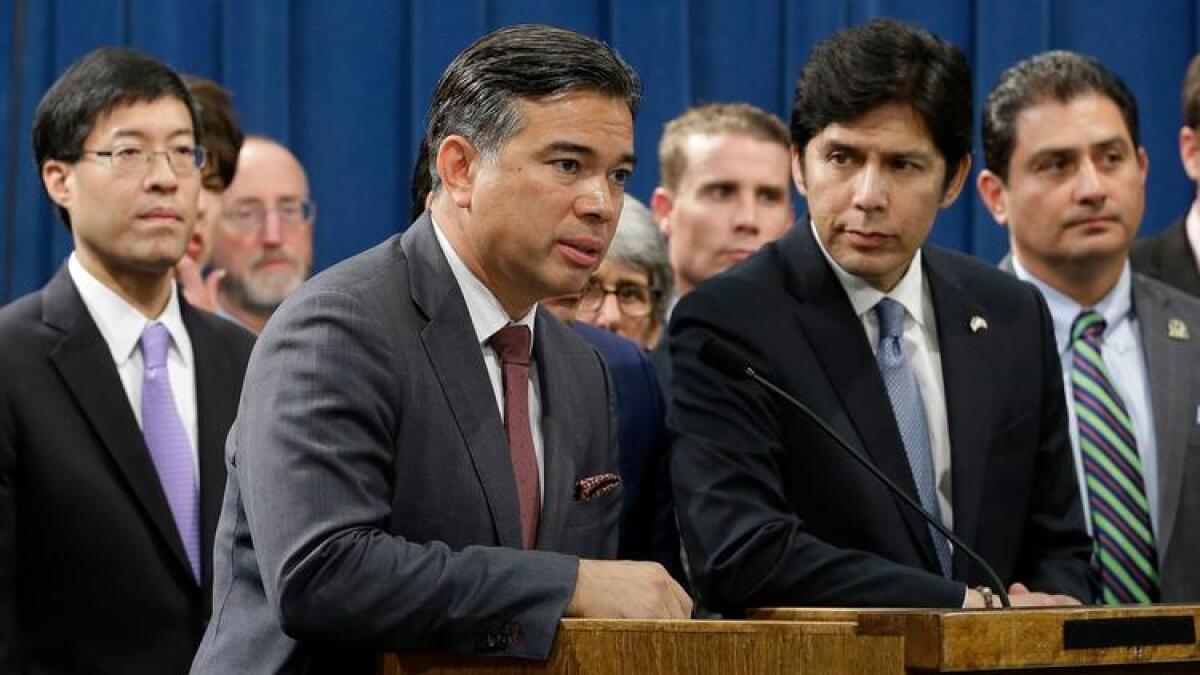
Gov. Jerry Brown on Sunday signed legislation that will require state officials to consider greenhouse gas emissions when choosing construction materials.
The measure, AB 262, was authored by Assemblyman Rob Bonta (D-Alameda) and directs the Department of General Services to draft standards for emissions. Bidders seeking state contracts for materials including steel, glass and insulation will have to start meeting them by July 1, 2019.
“The goal of this bill is laudable and consistent with our efforts to address climate change,” Brown wrote in a letter when signing the legislation.
The governor asked state officials to continue looking at state contracting and submit more recommendations about ways to reduce emissions.
- Share via
This Republican is running to the right in California: ‘I will help the president make America great again’
Tim Donnelly, former California state assemblyman and current columnist for the far right outlet Breitbart, announced a bid for Congress on Monday, saying he’ll have President Trump’s back.
In a state that’s positioned itself as the leader of the so-called resistance to Trump, it’s an unusual statement of support for the president, but not that unexpected given the source.
Donnelly is known as a conservative firebrand and a tea party favorite who has run for multiple offices. In a video announcing his bid for the 8th Congressional District, Donnelly says he’ll advocate for a wall along the Mexican border, a repeal of the Affordable Care Act without replacing it, an end to laws requiring people to be vaccinated, and literal interpretation of the Constitution.
It’s his second try for the district, which ranges along most of the state’s eastern border from Joshua Tree to near Lake Tahoe. Yucca Valley Rep. Paul Cook has represented the area for three terms.
In the video, Donnelly claims the district “overwhelmingly” supported the president in the last election, but Trump won with just 54.7% of the vote.
“We sent him to D.C. because he said he would make America great again, and we’ve watched as the Congress, this ‘do-nothing’ Congress has stymied him at every turn,” Donnelly said in an announcement video. “So my promise to you is very simple: I will back the president’s agenda because I know you back it—and I’ll have his back because he’s got yours.”
Cook won reelection in 2016 with 62.3% of the vote. His most recent campaign finance report shows he has $761,287 in cash on hand. Three Democrats have also filed to run against Cook.
Donnelly also ran for governor in 2014, finishing third in the primary behind Gov. Jerry Brown and Republican Neel Kashkari.